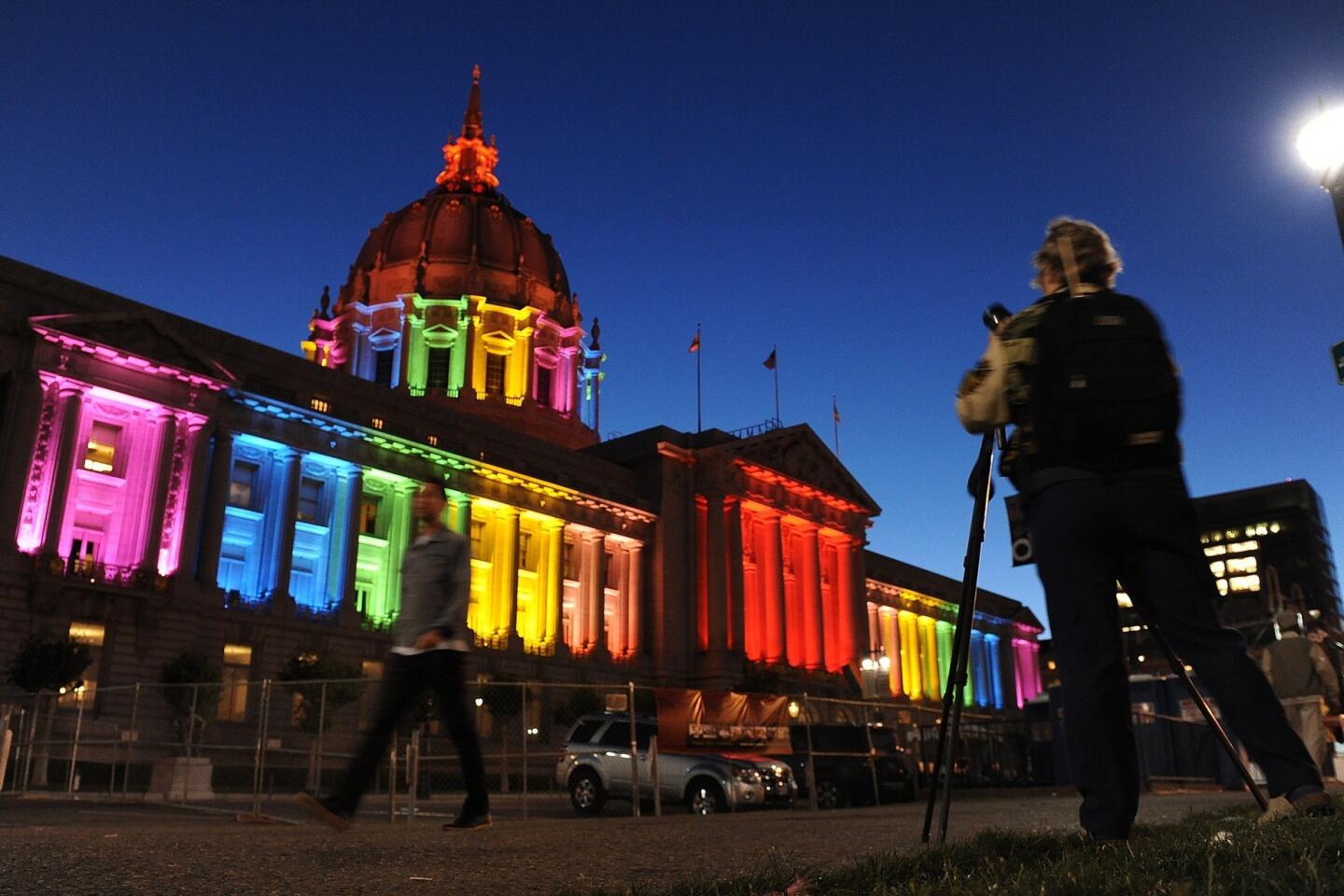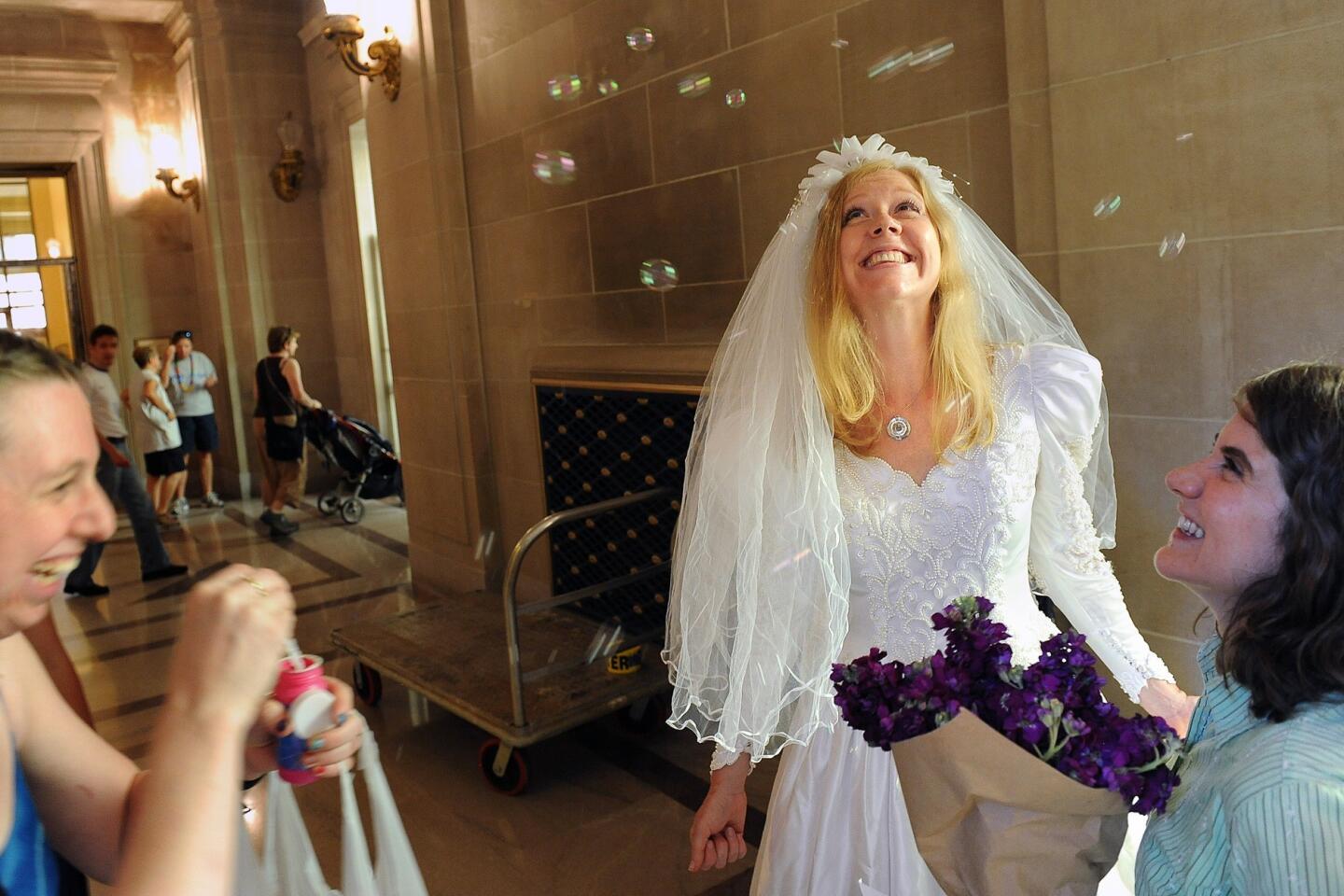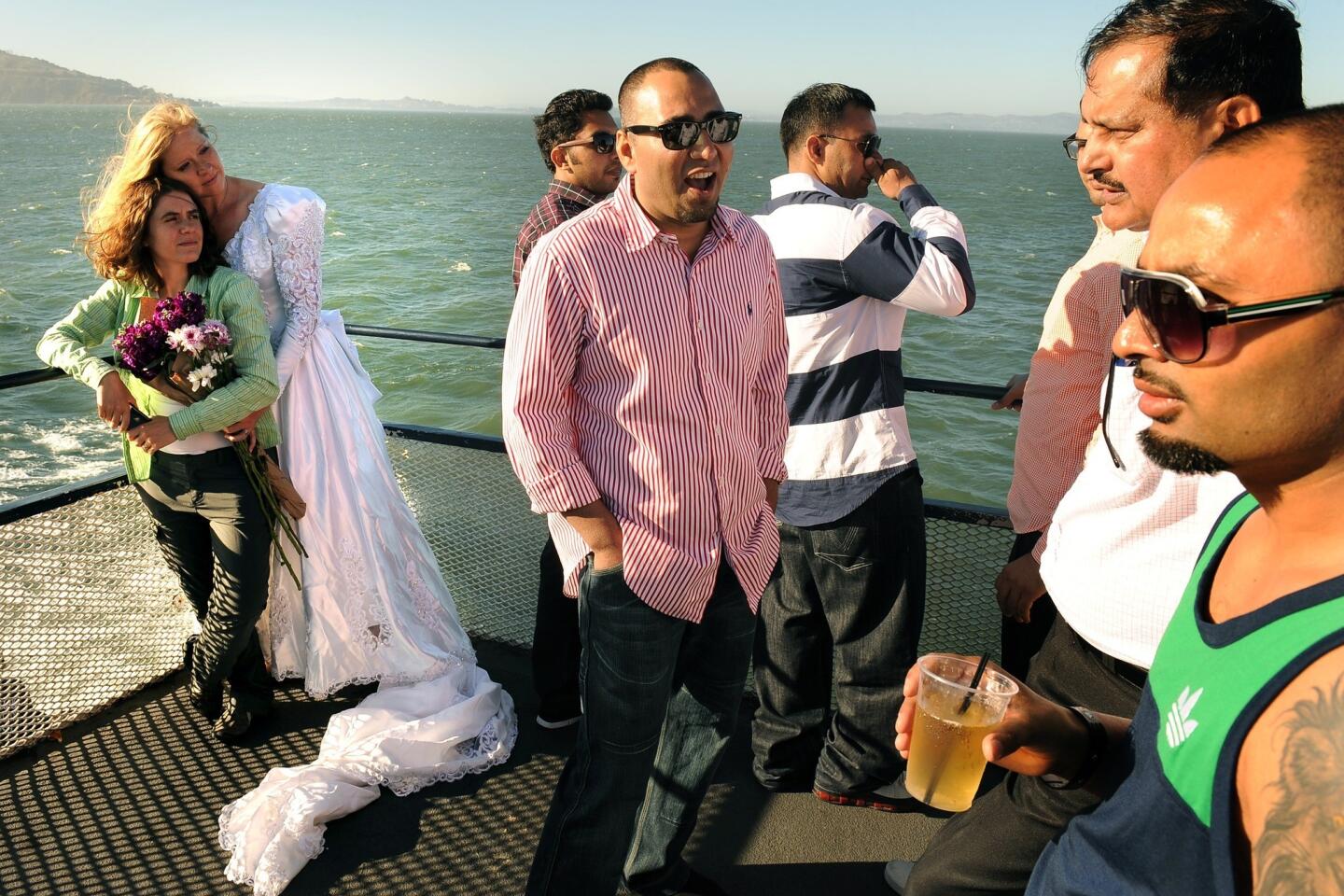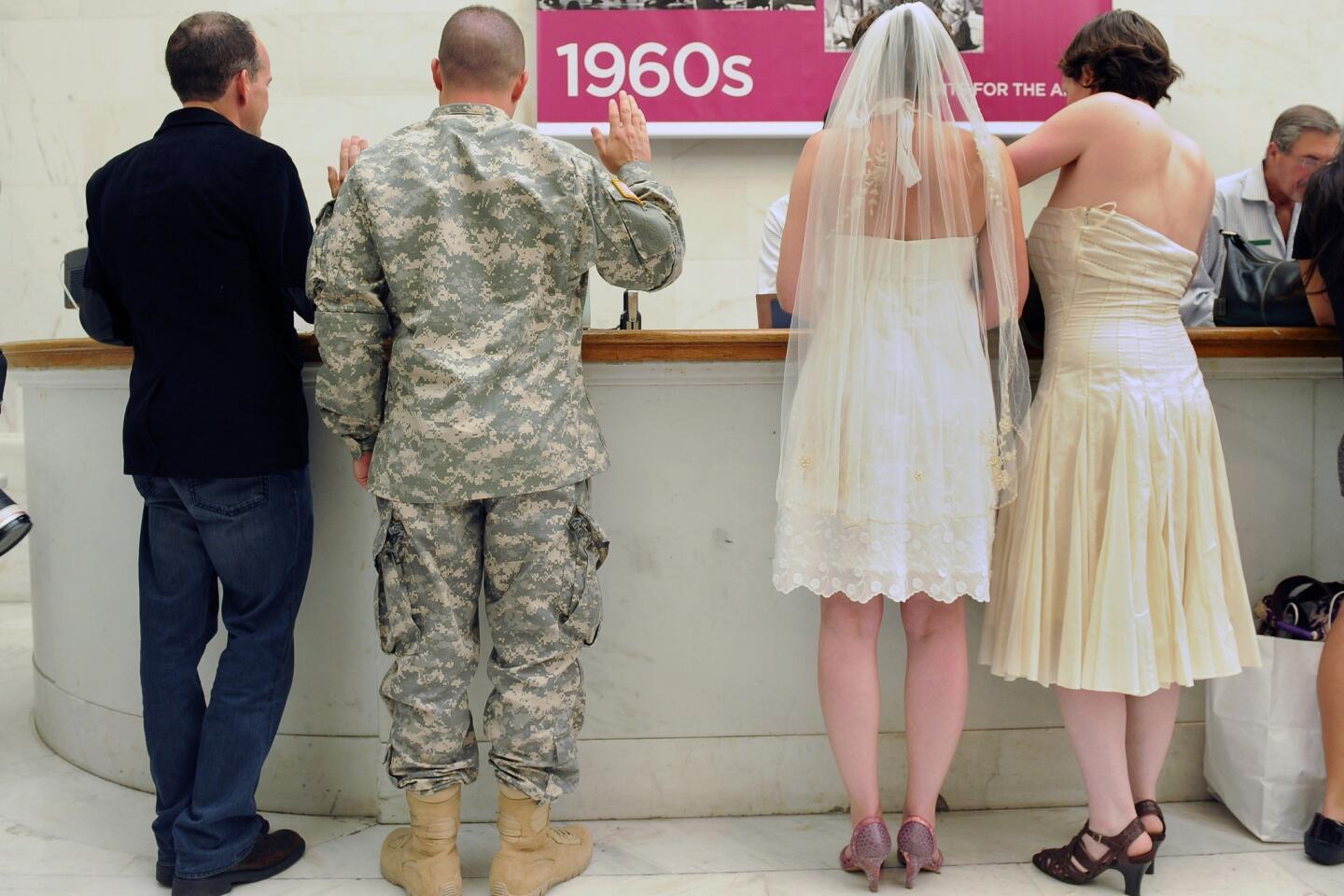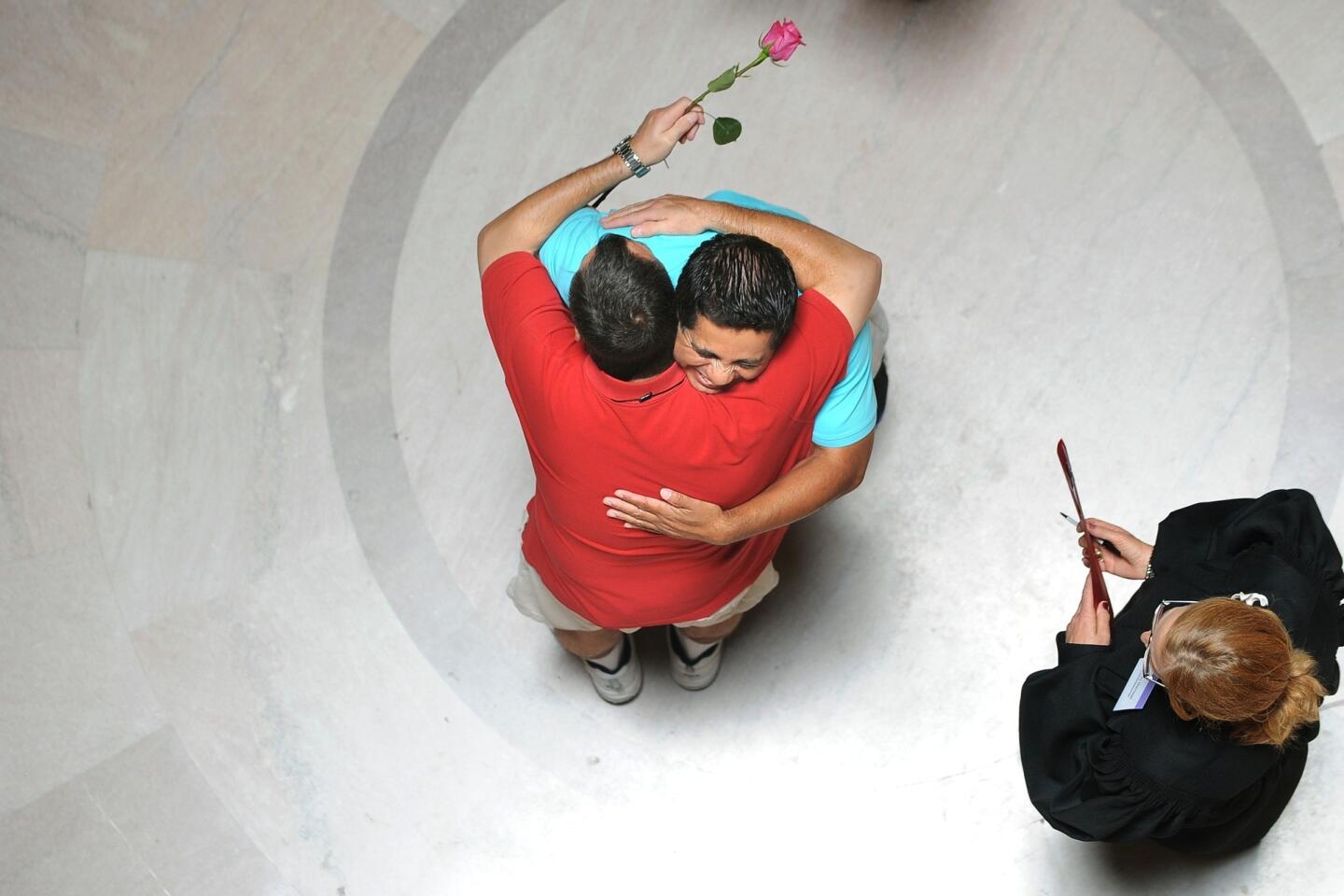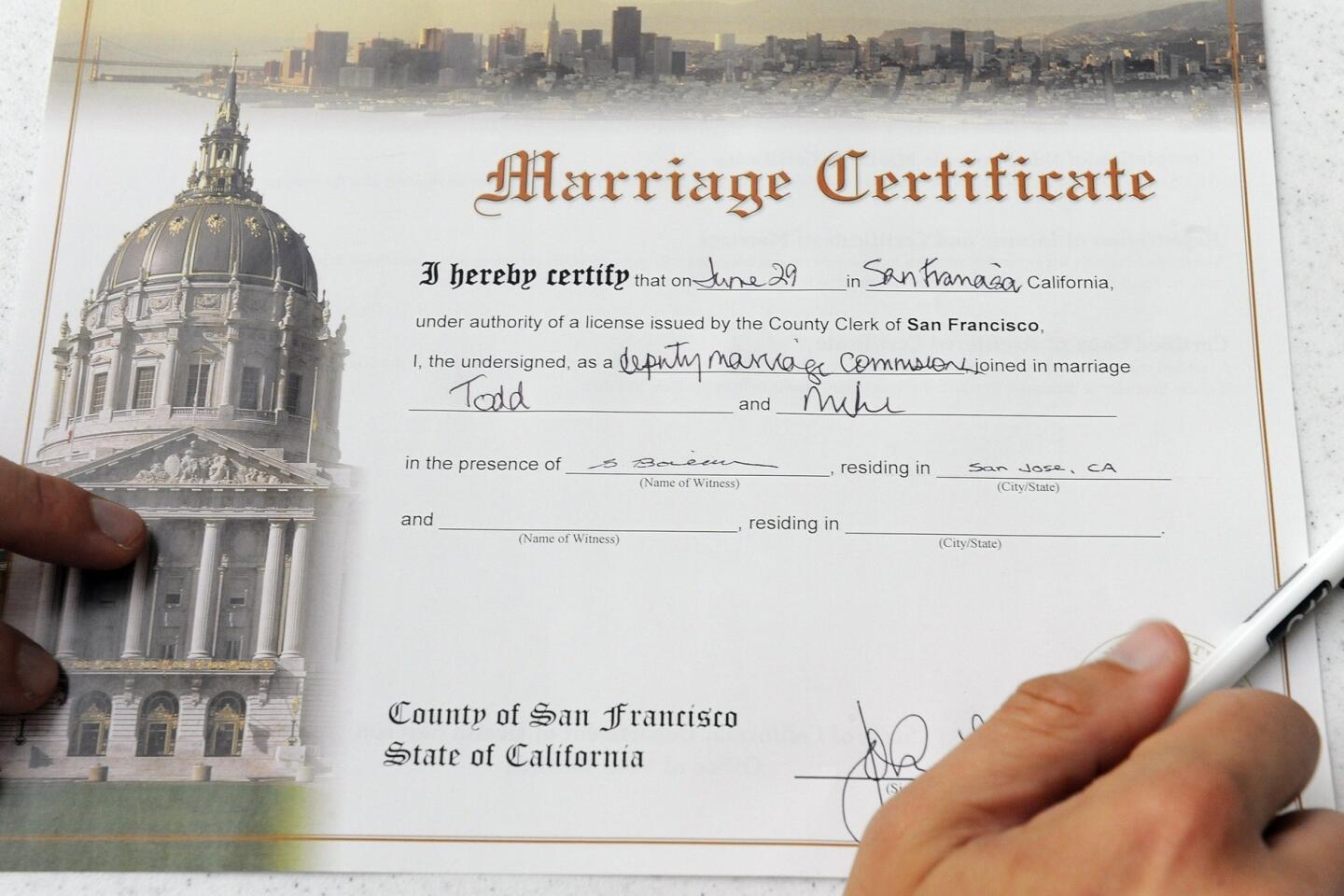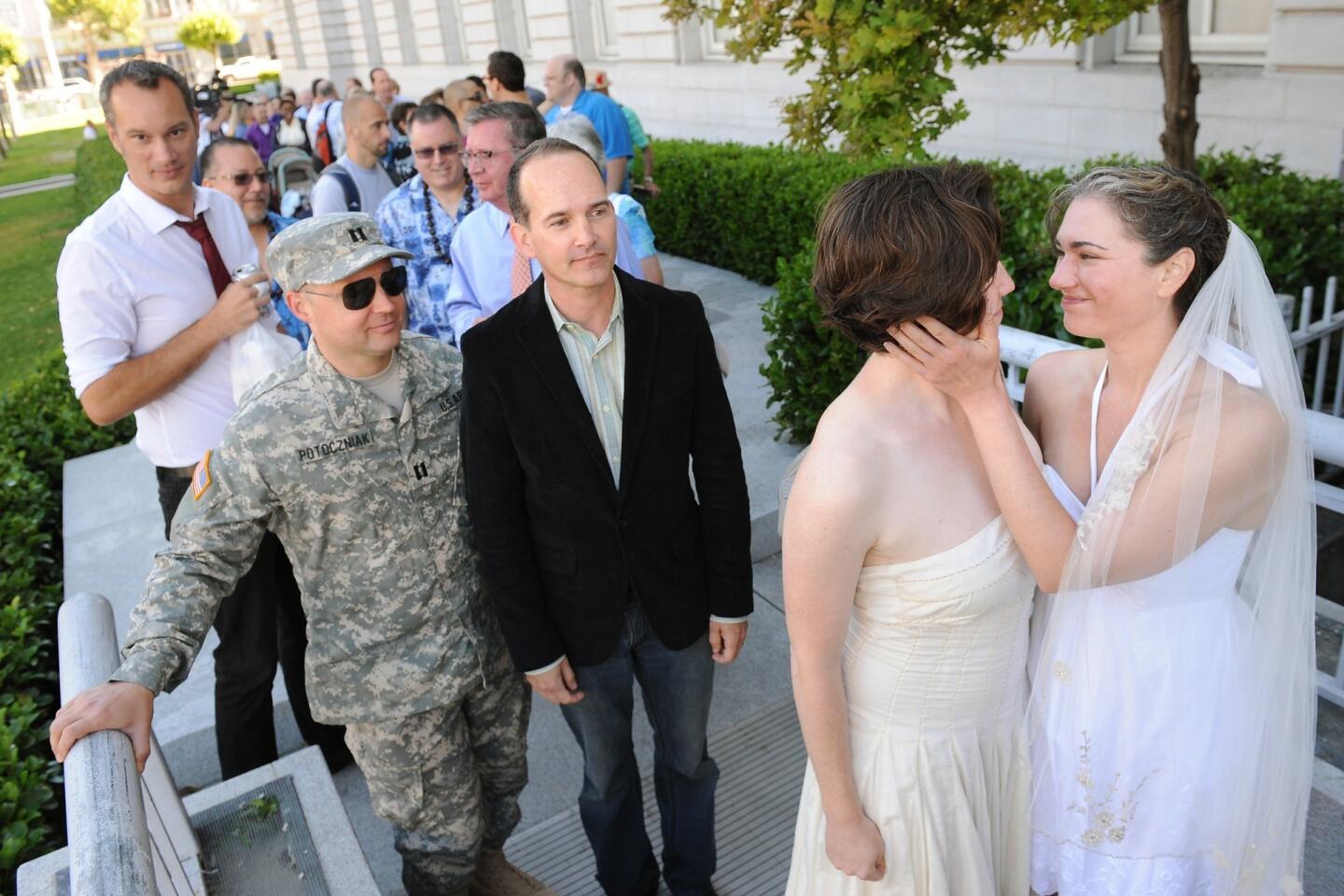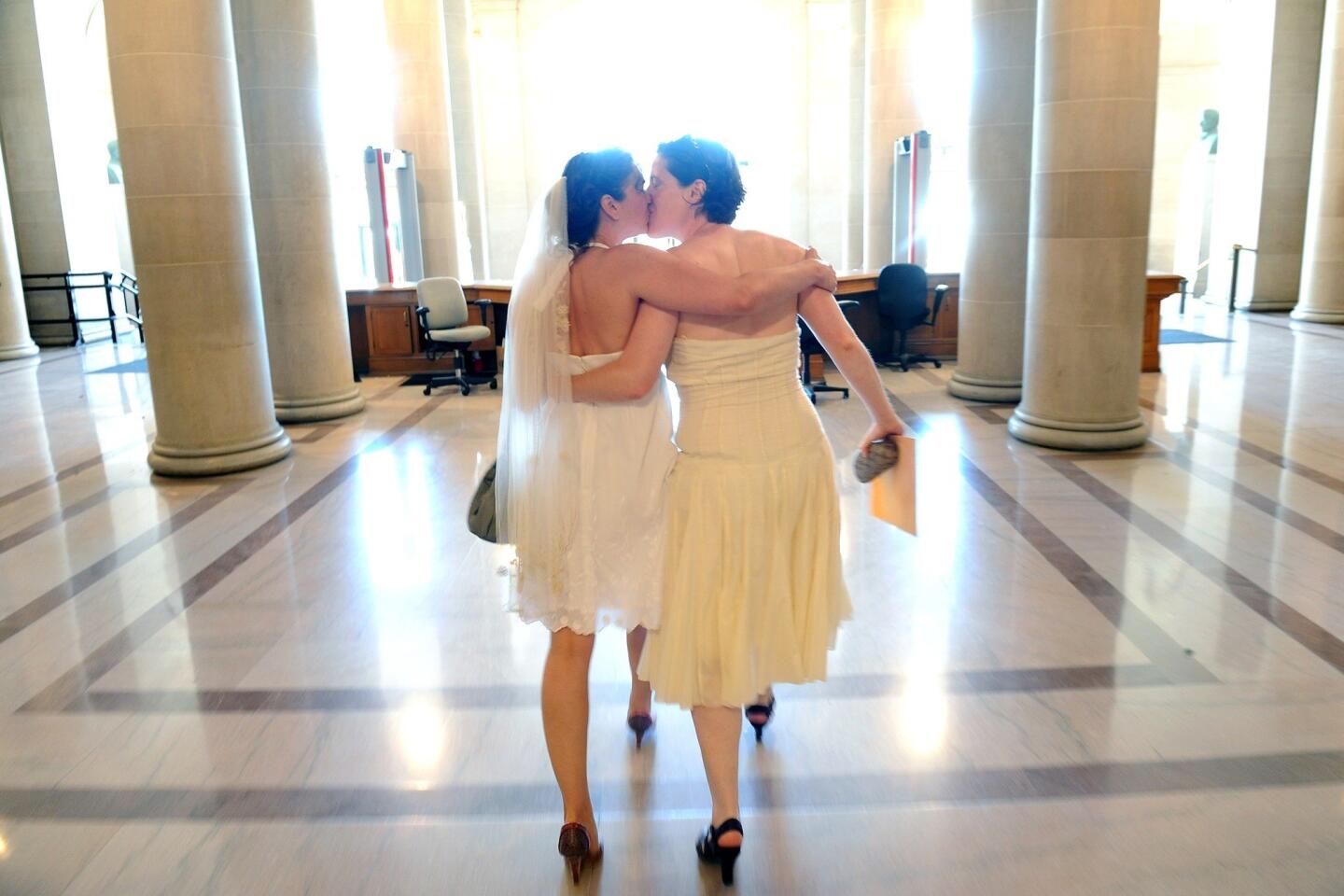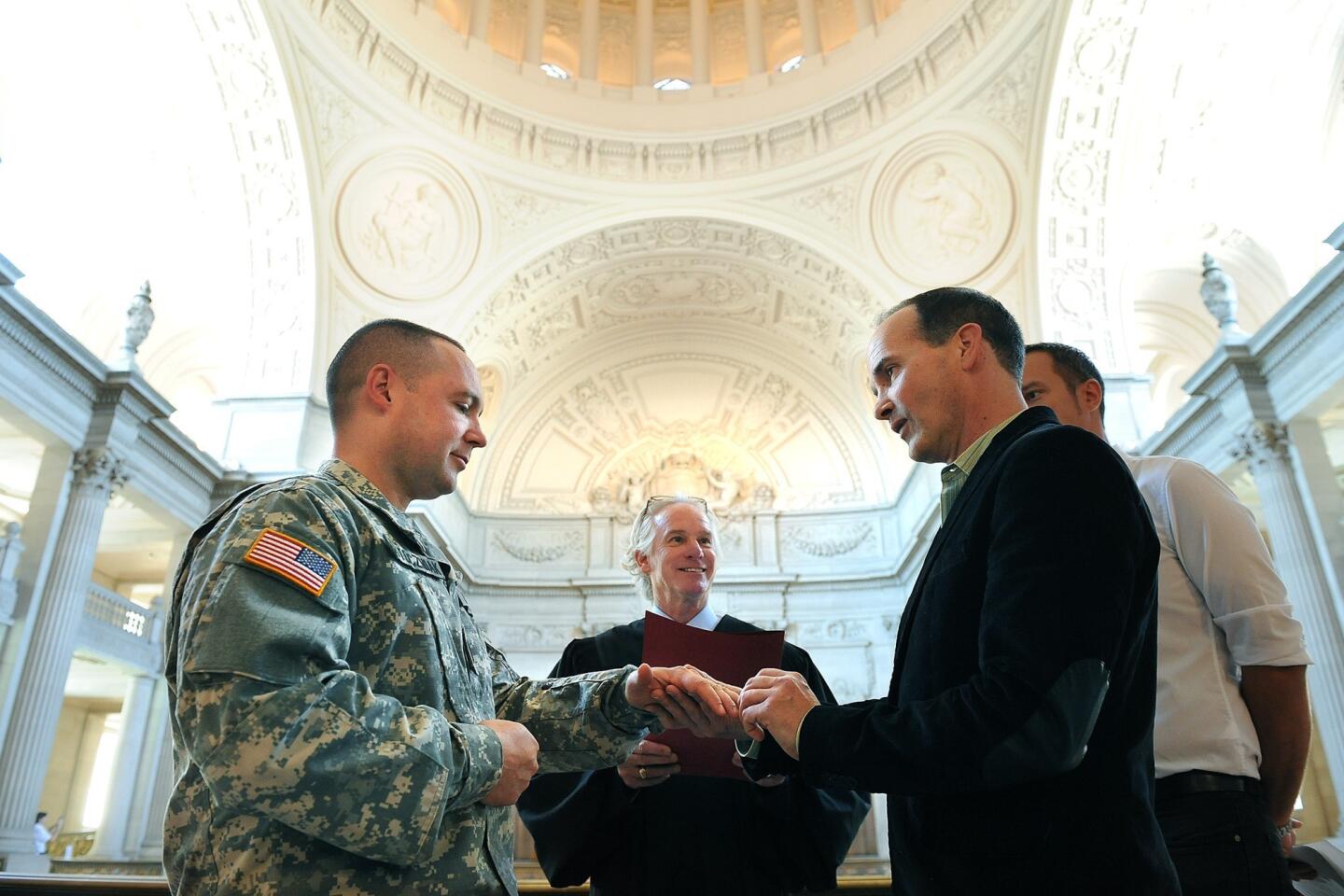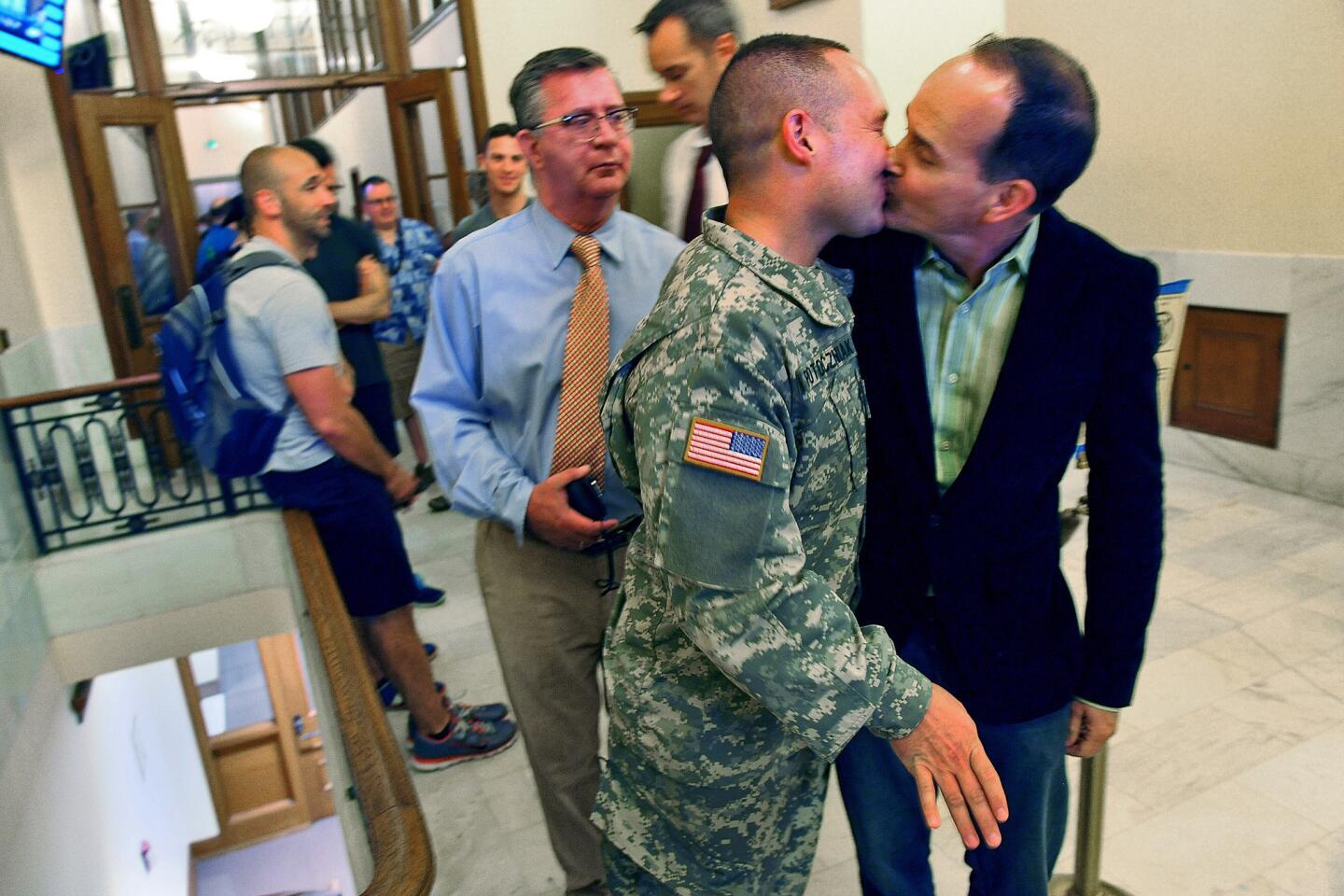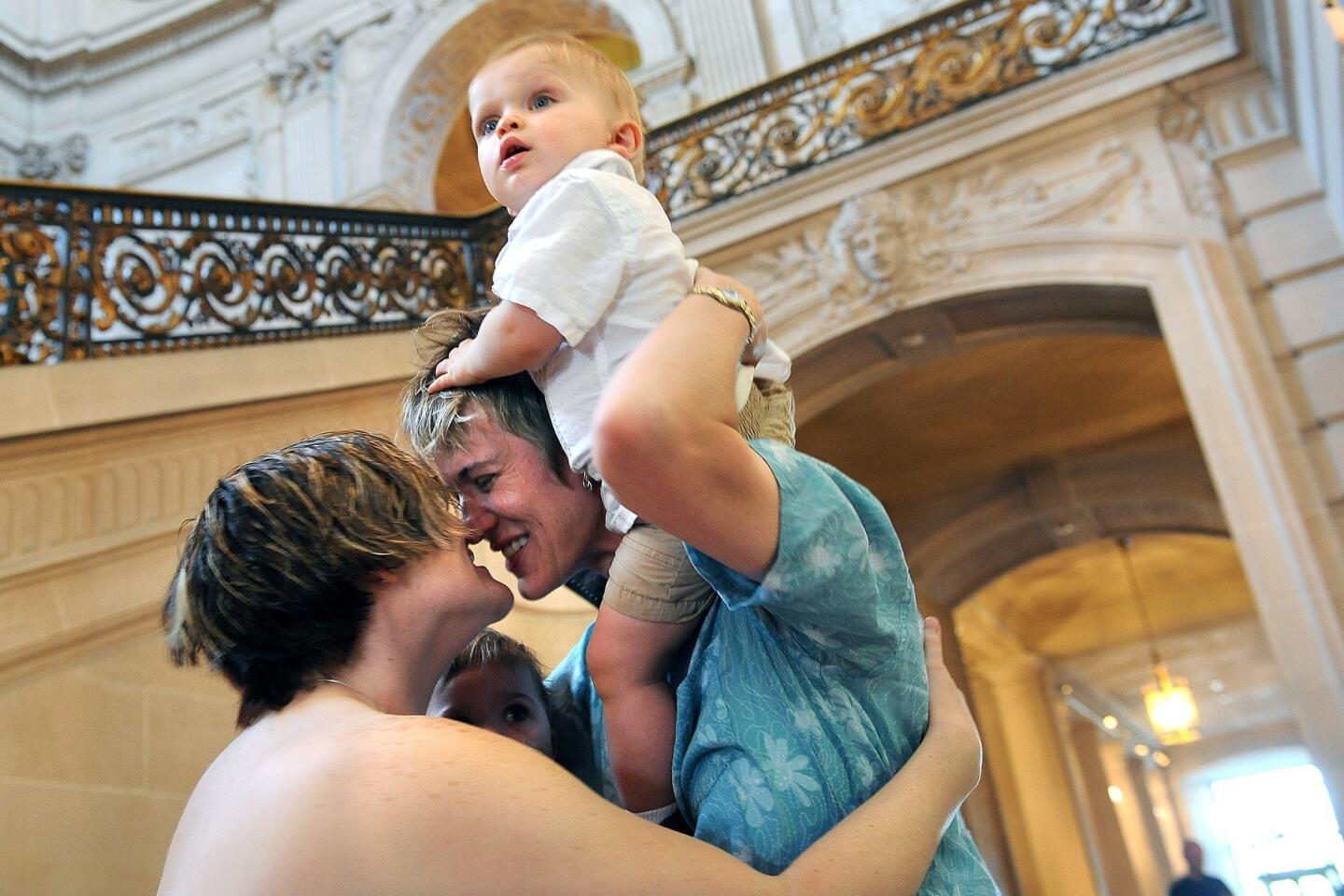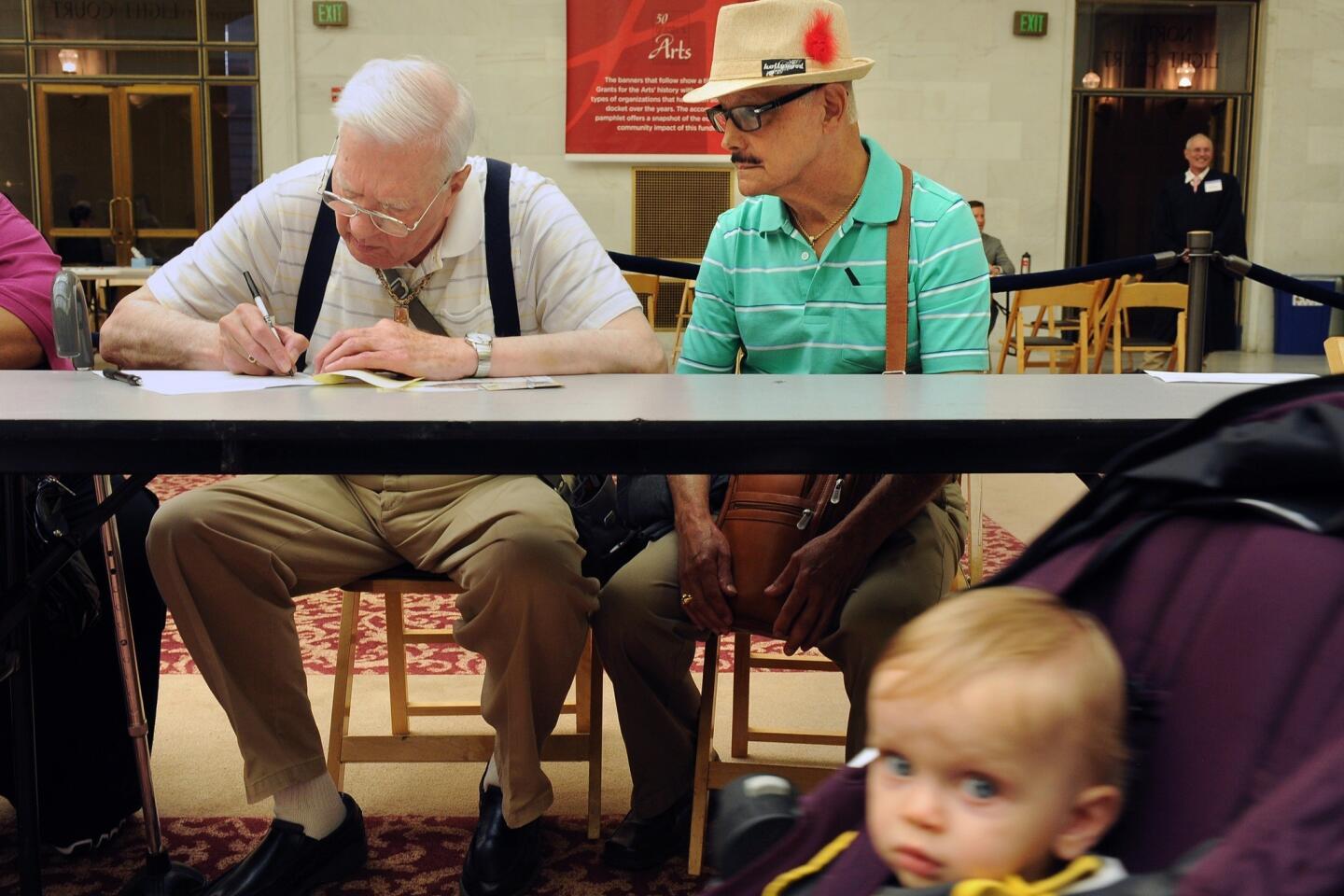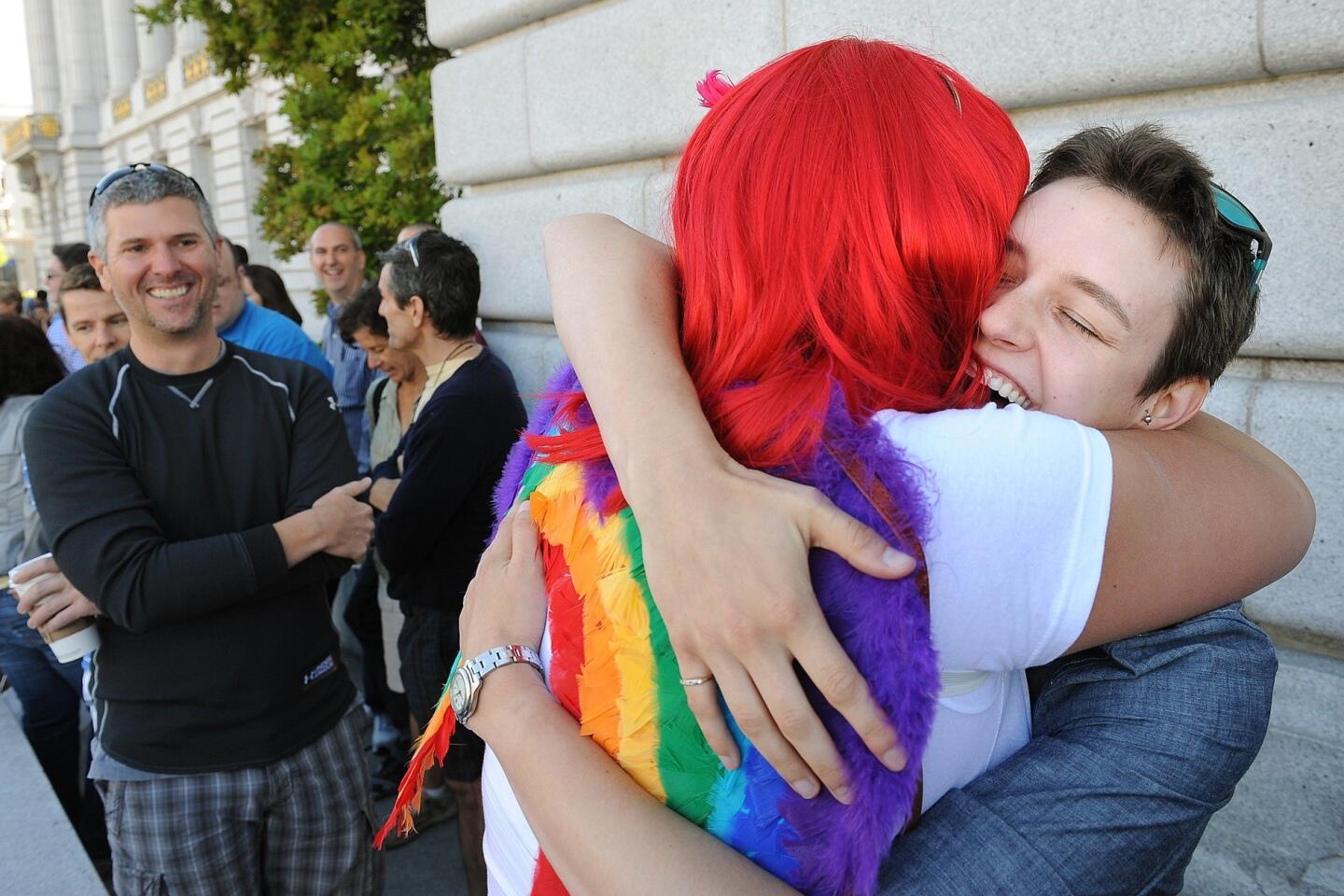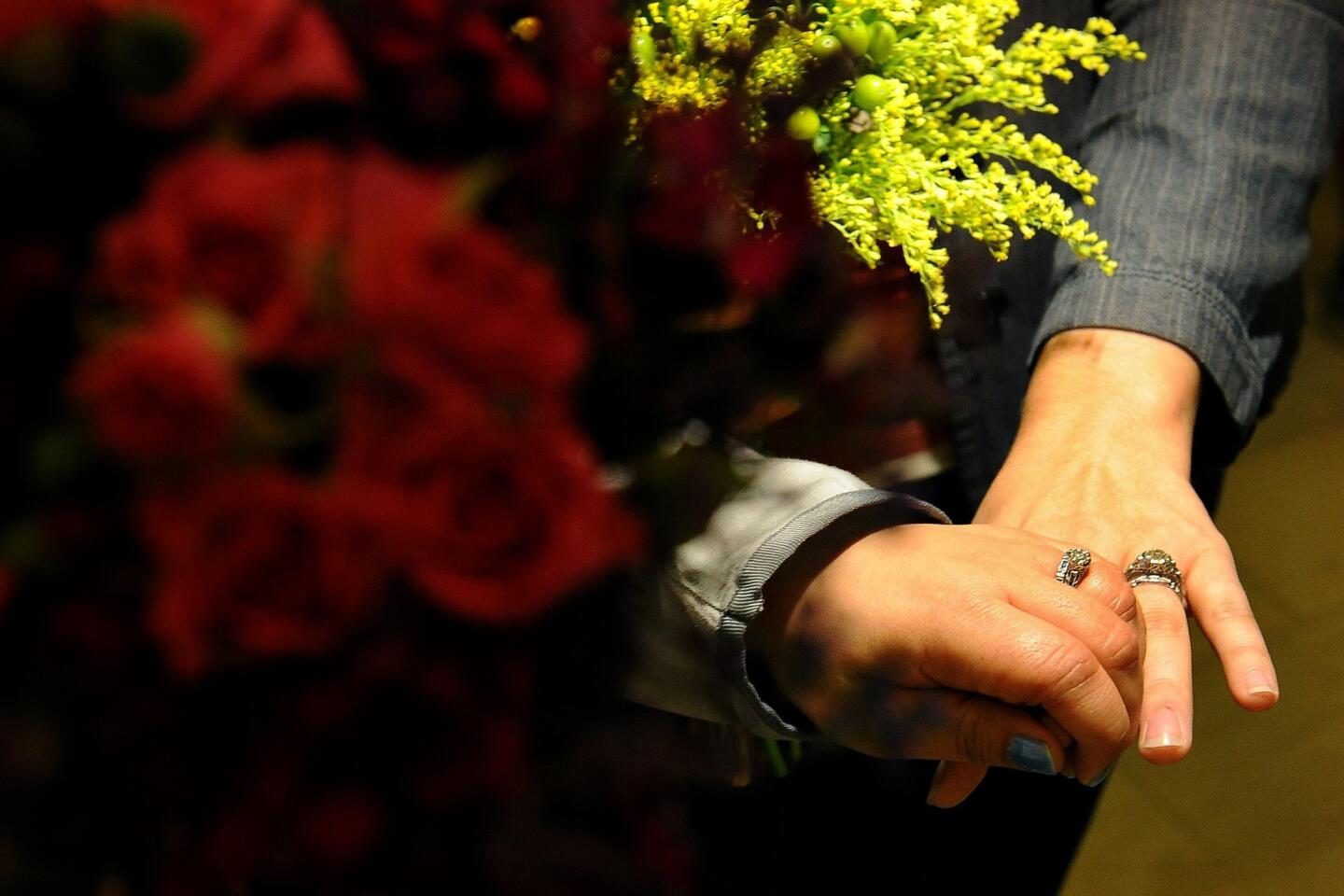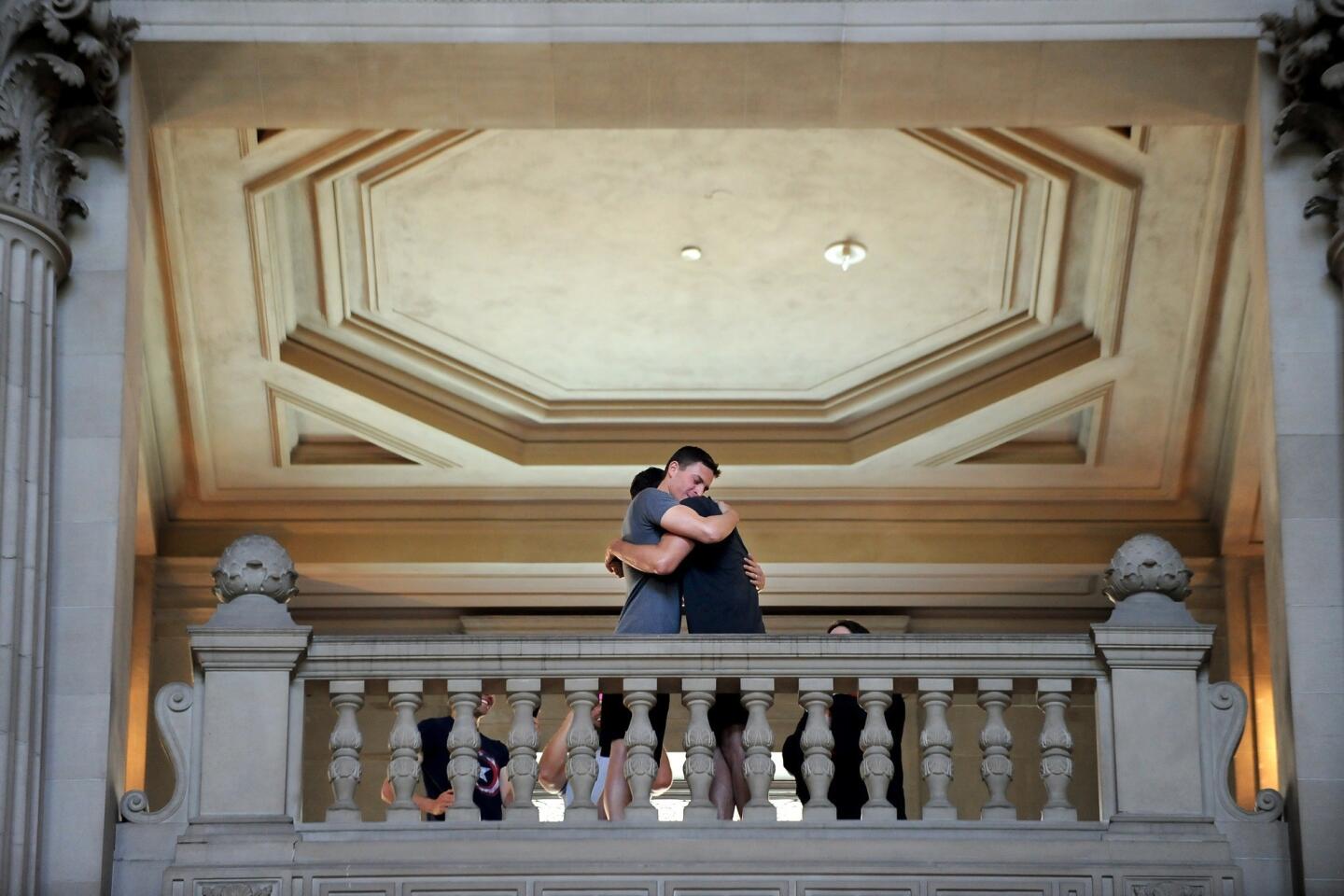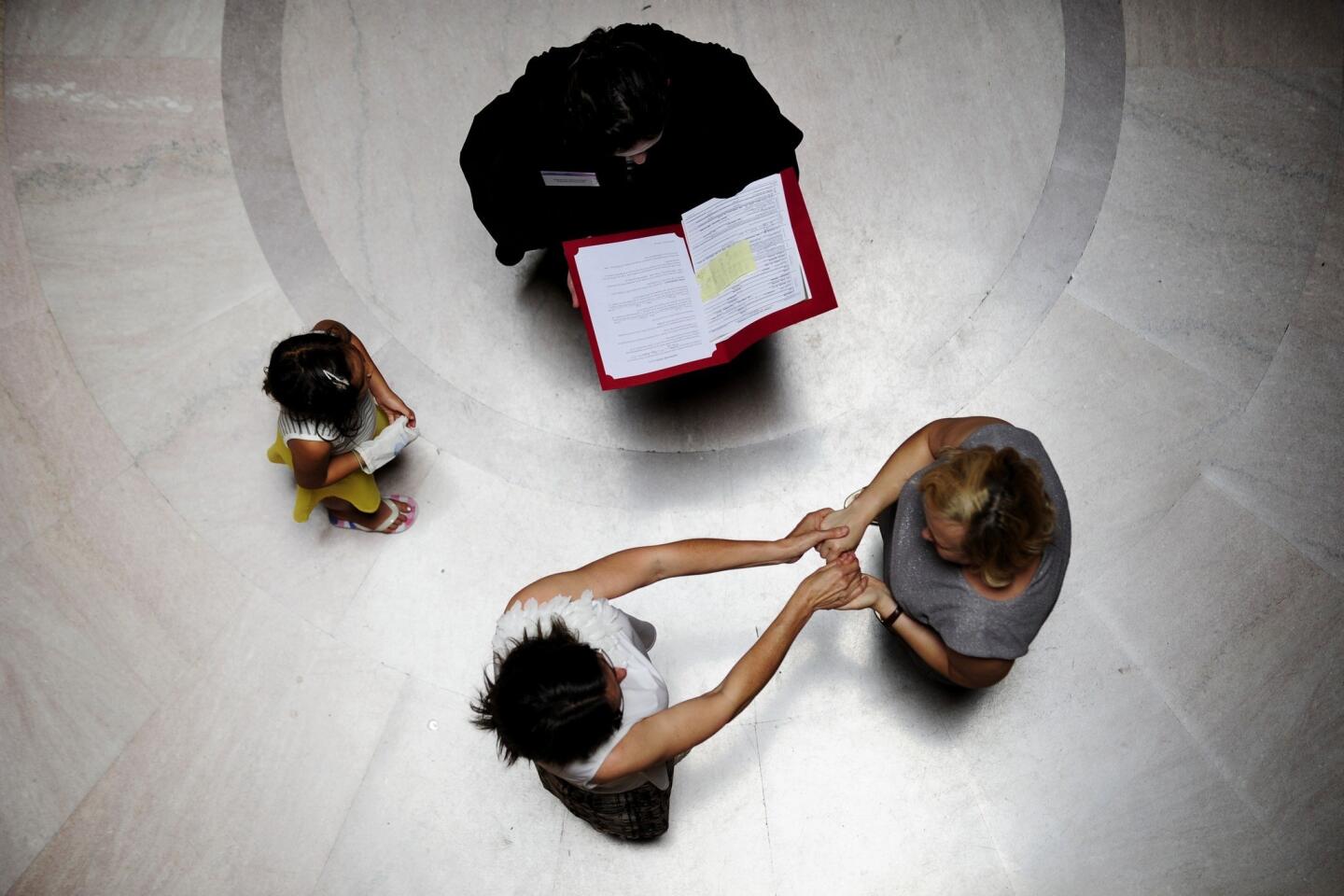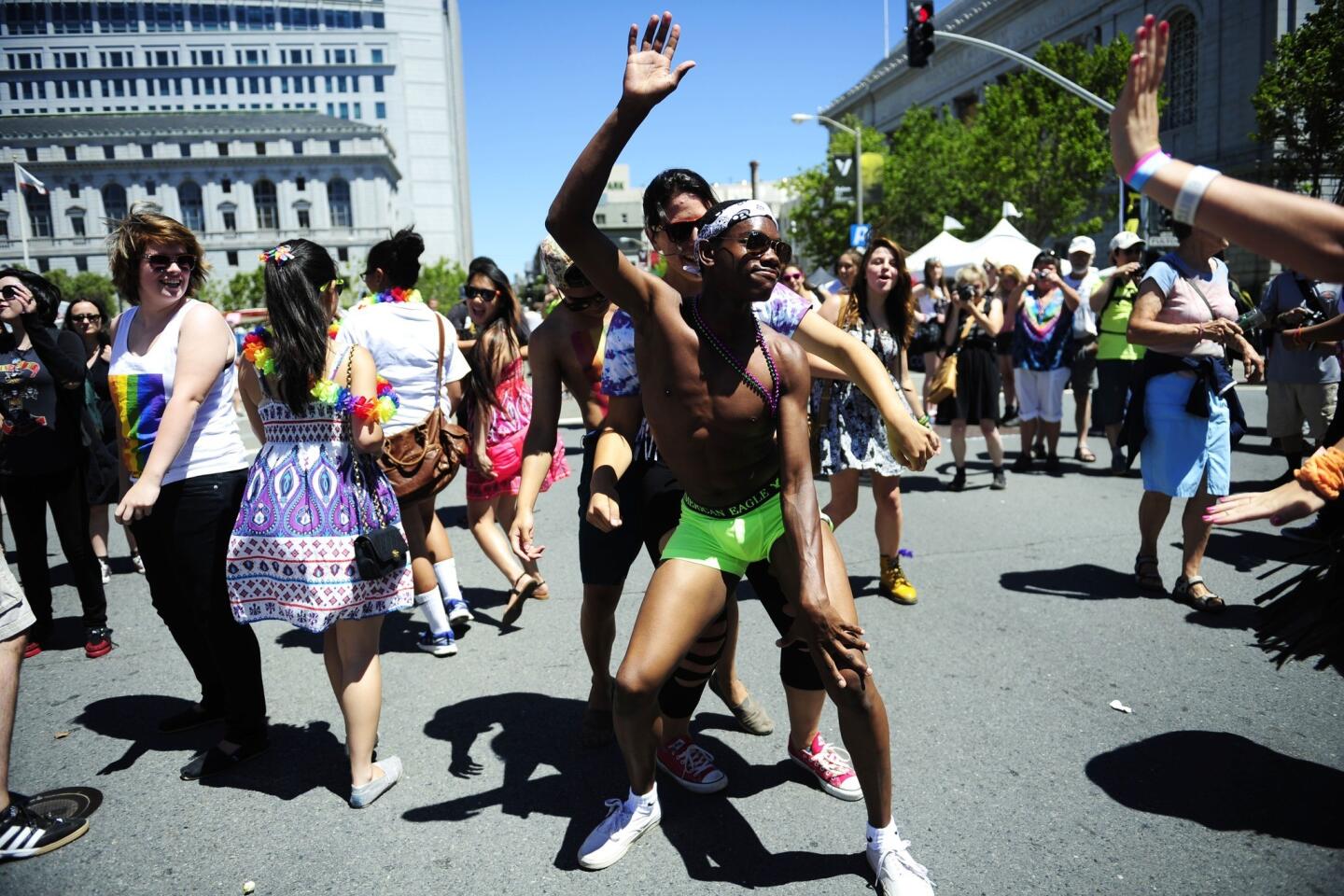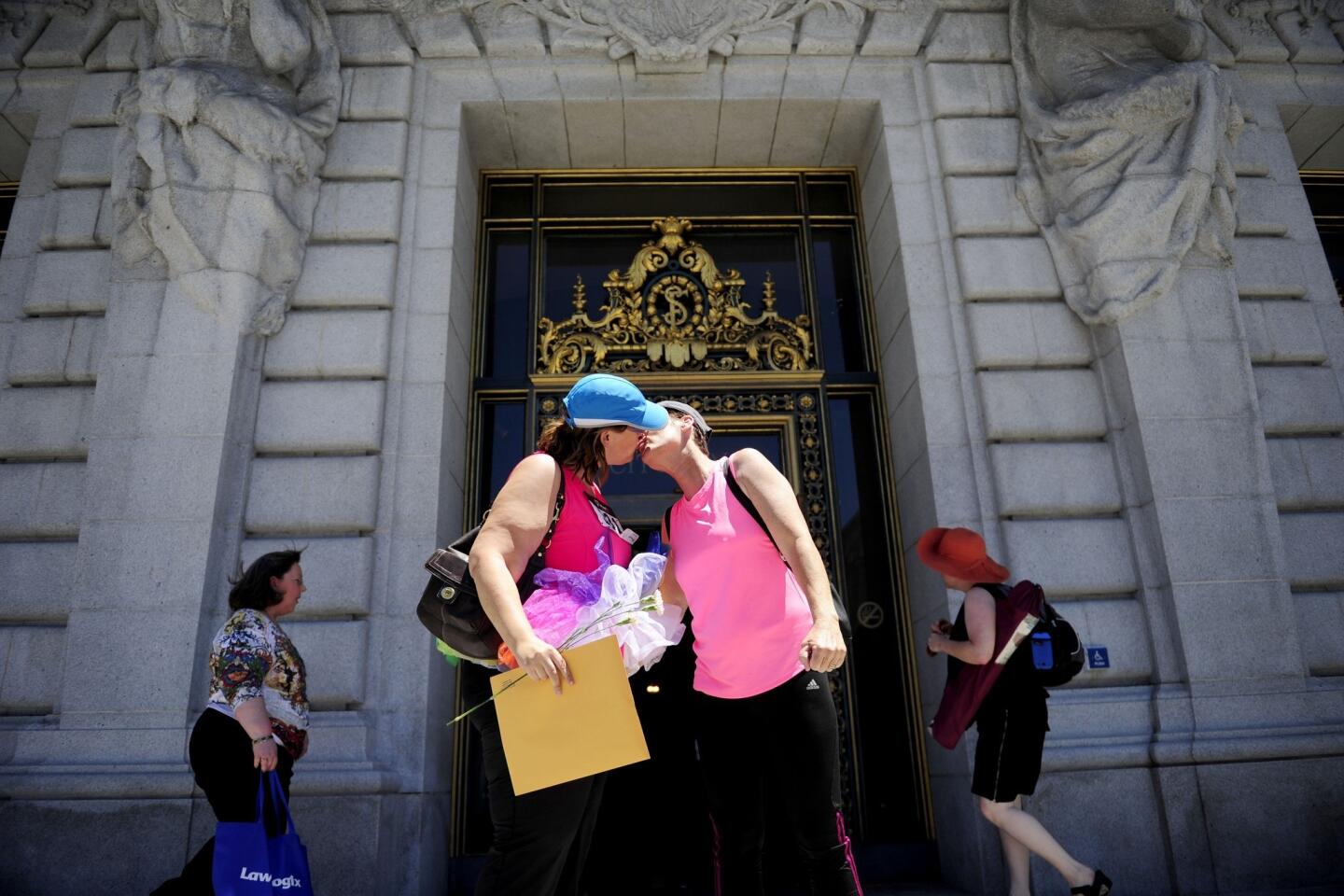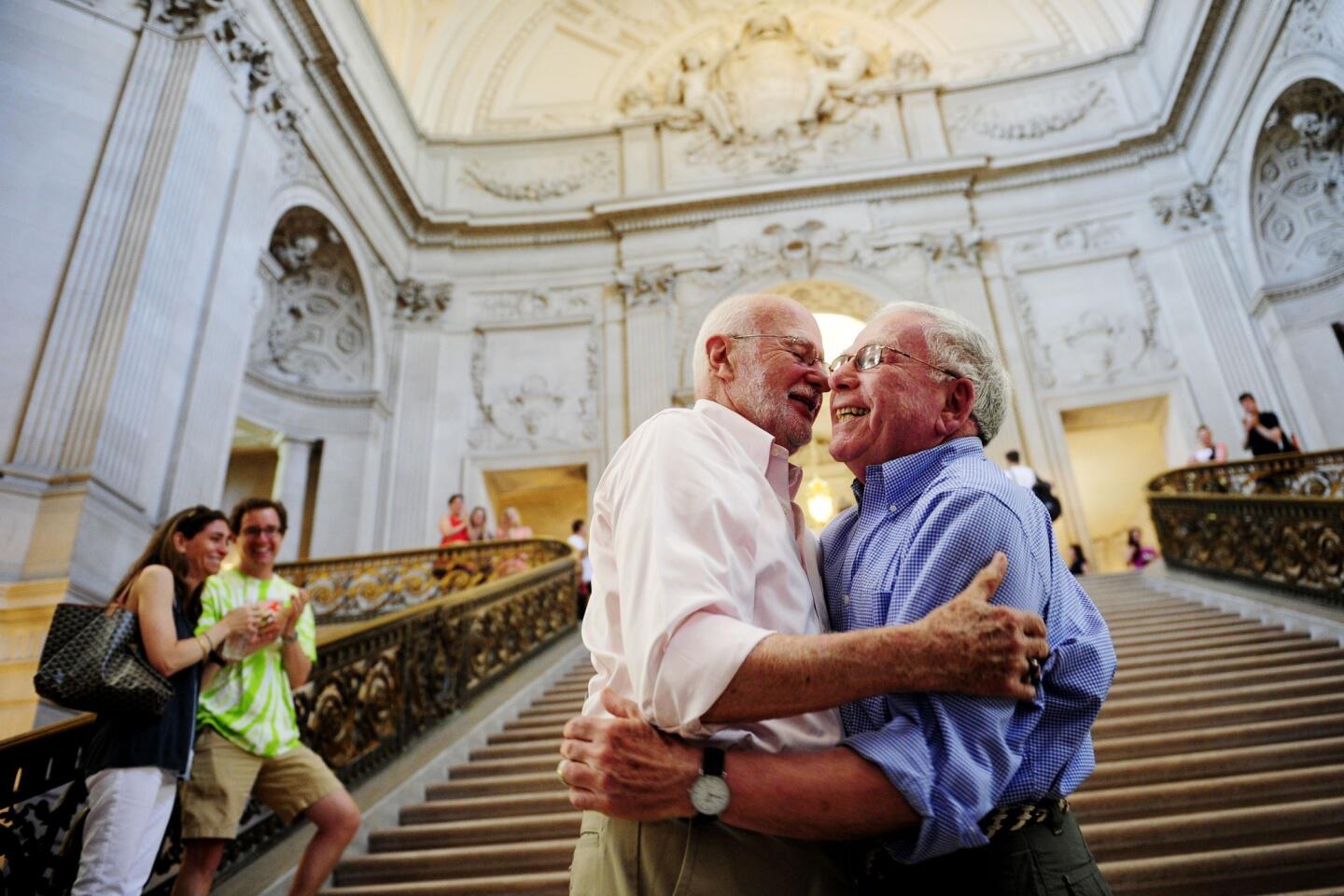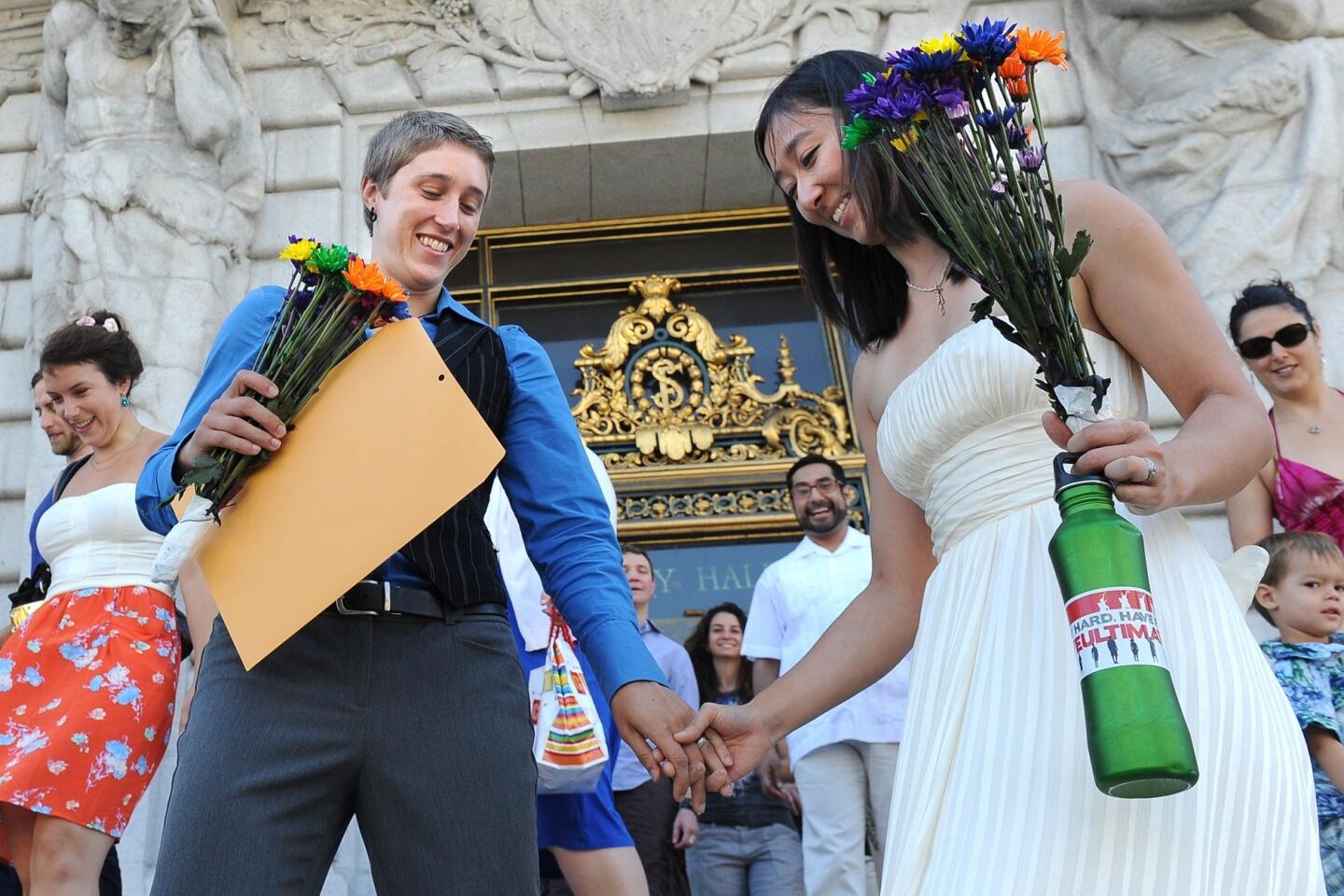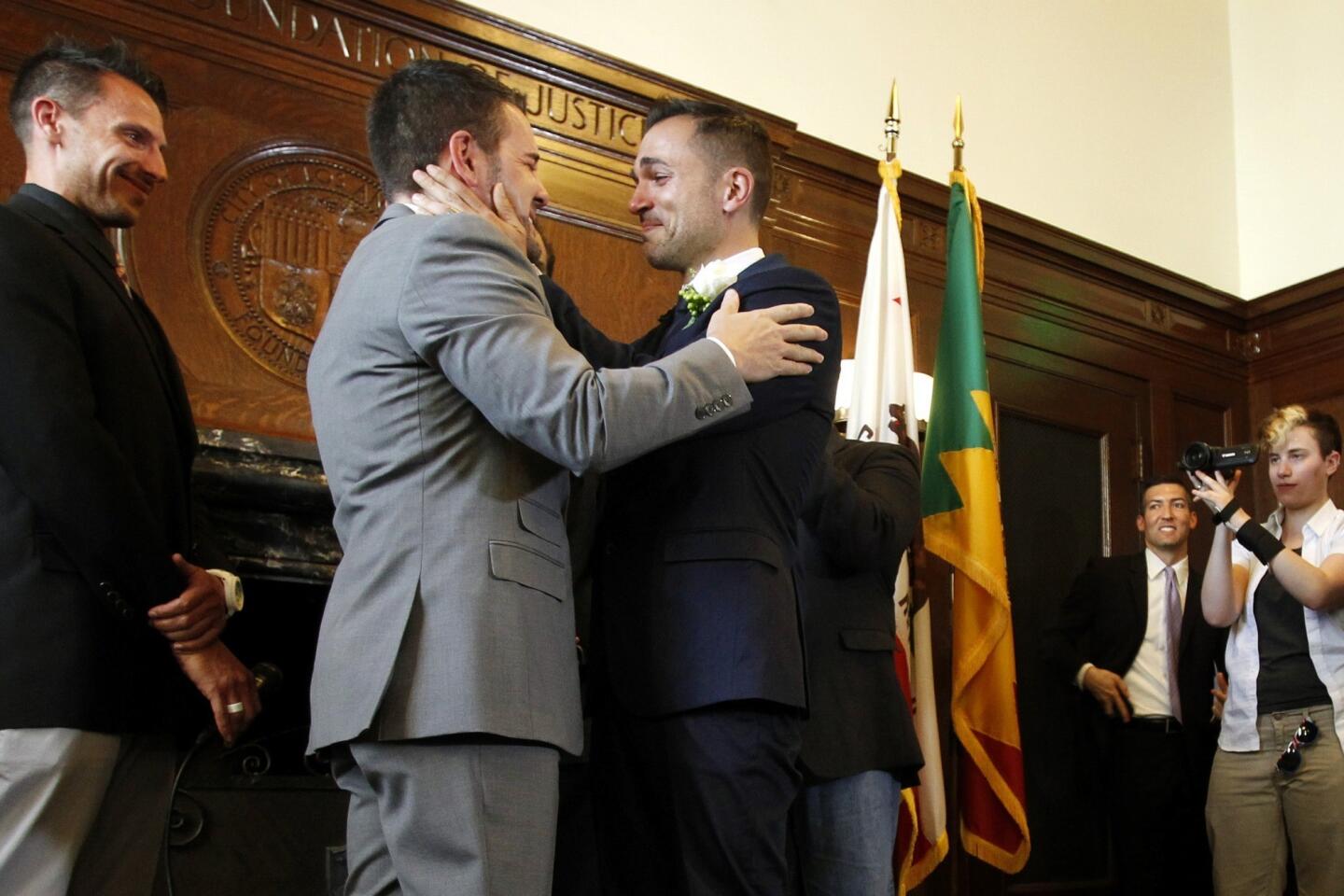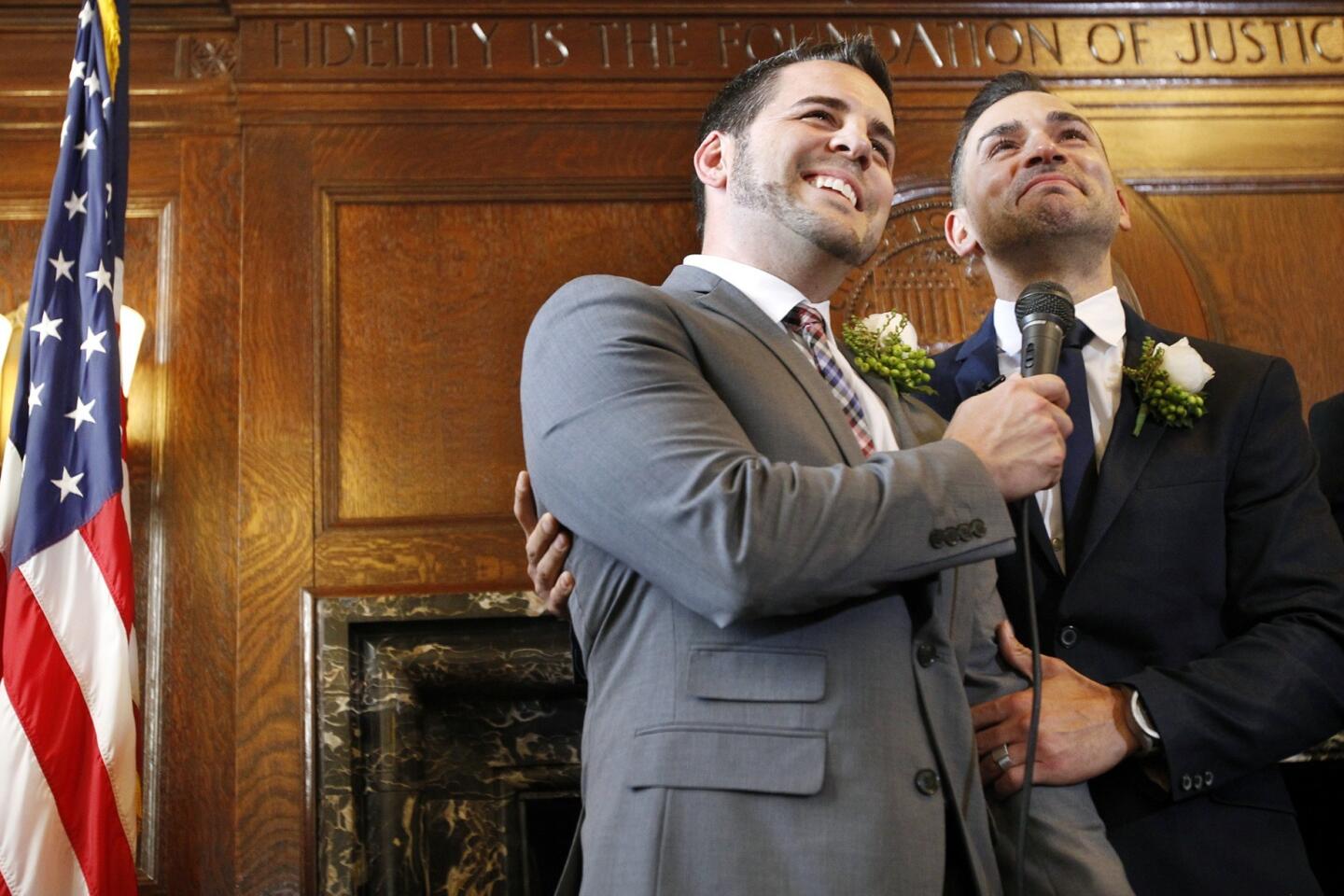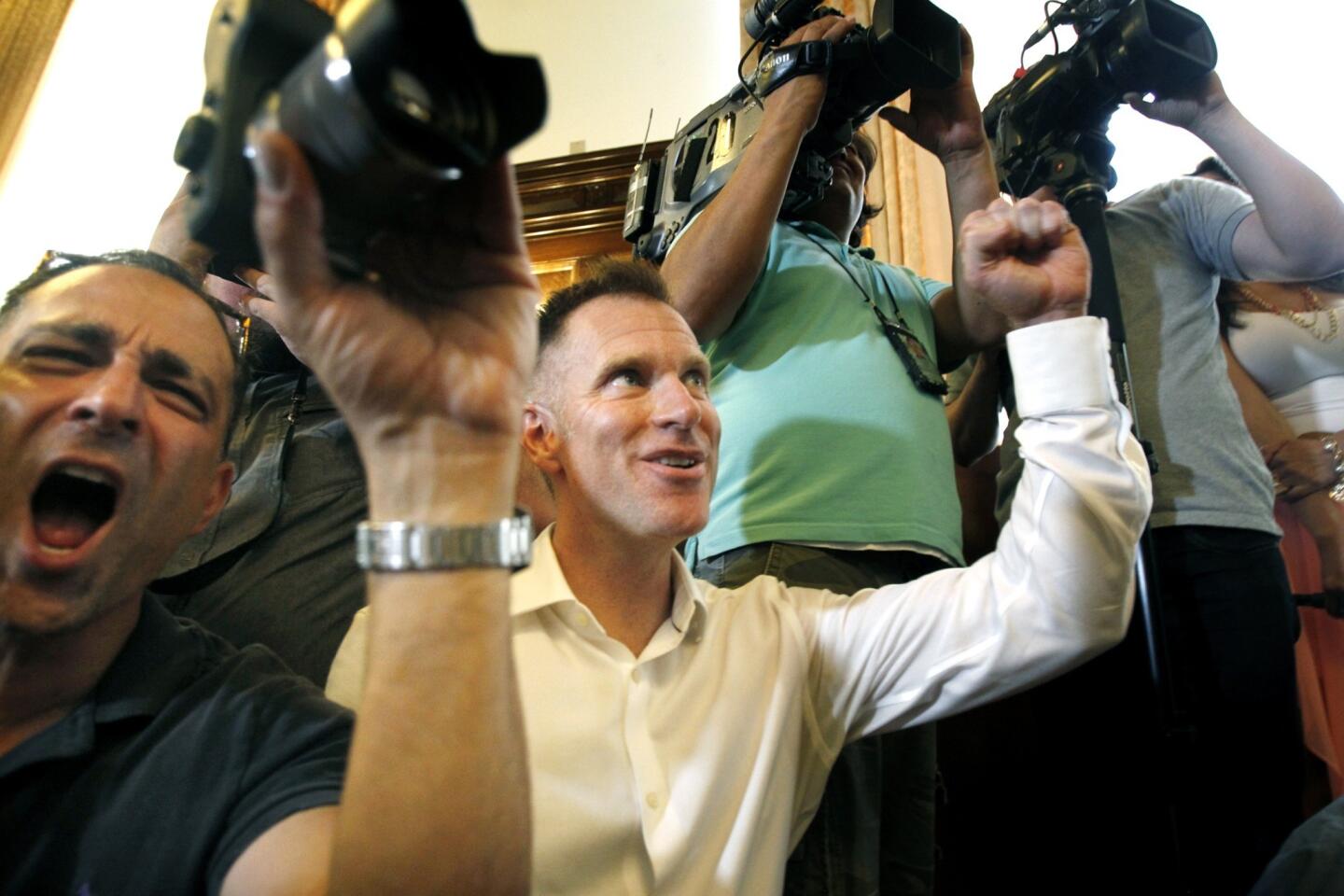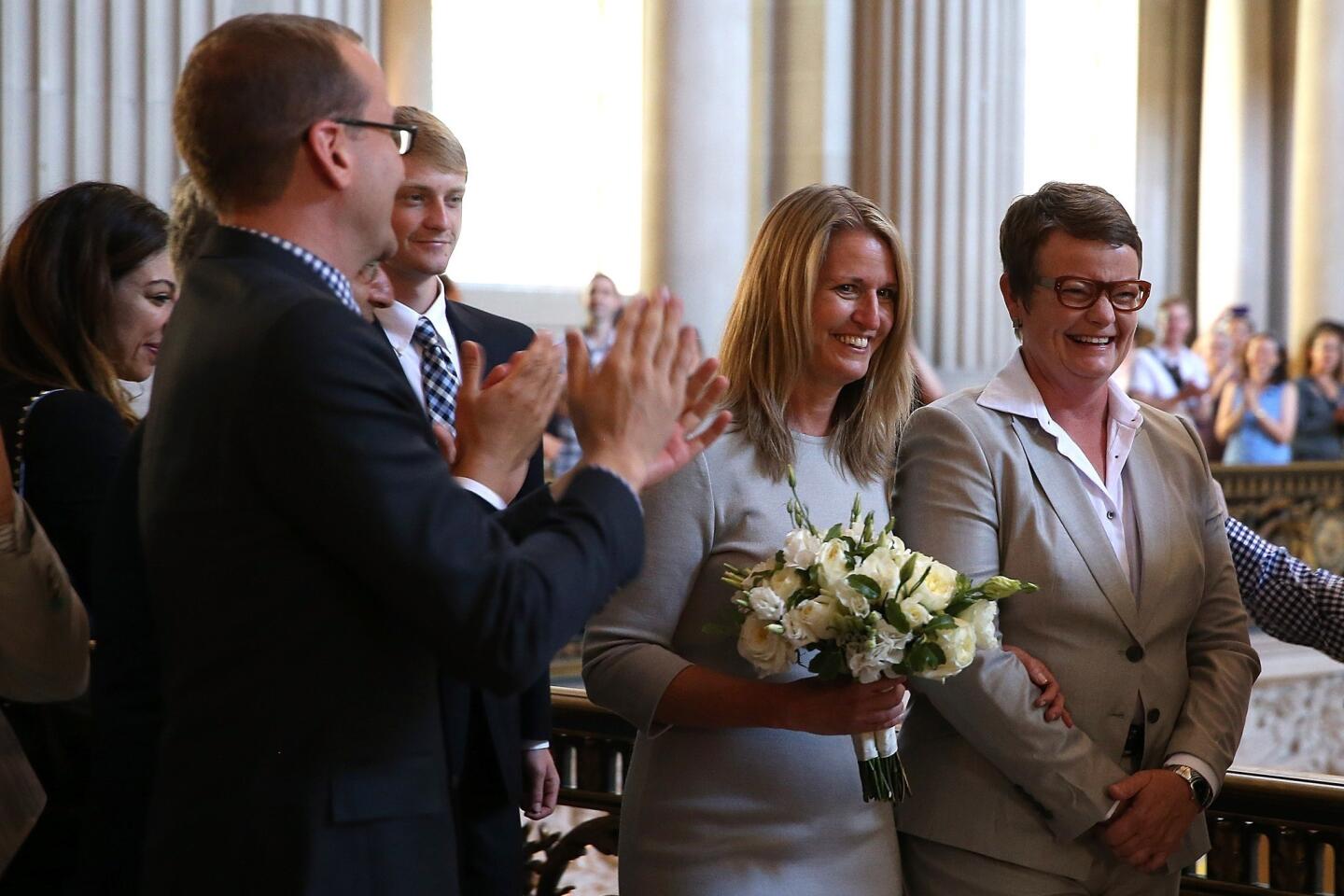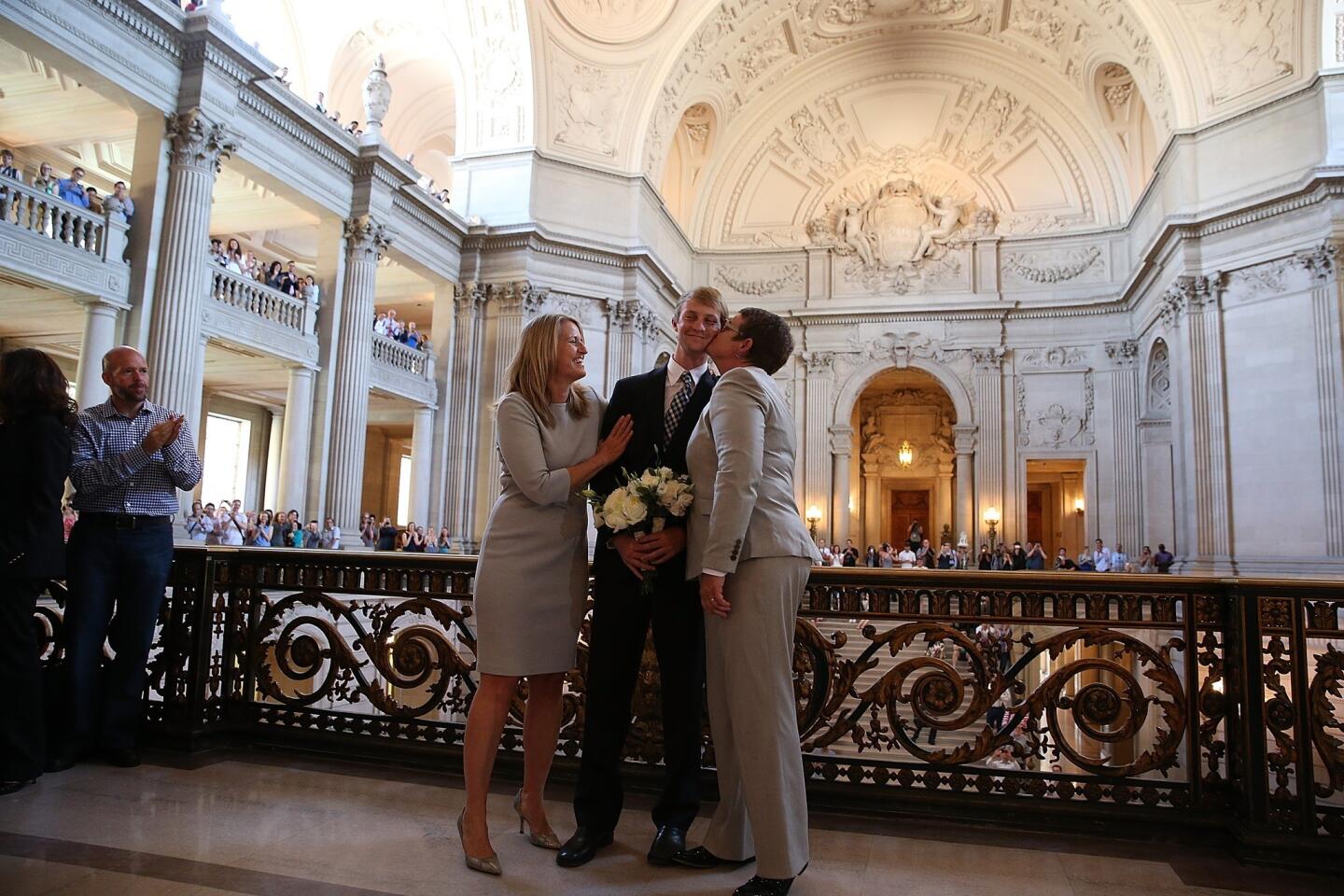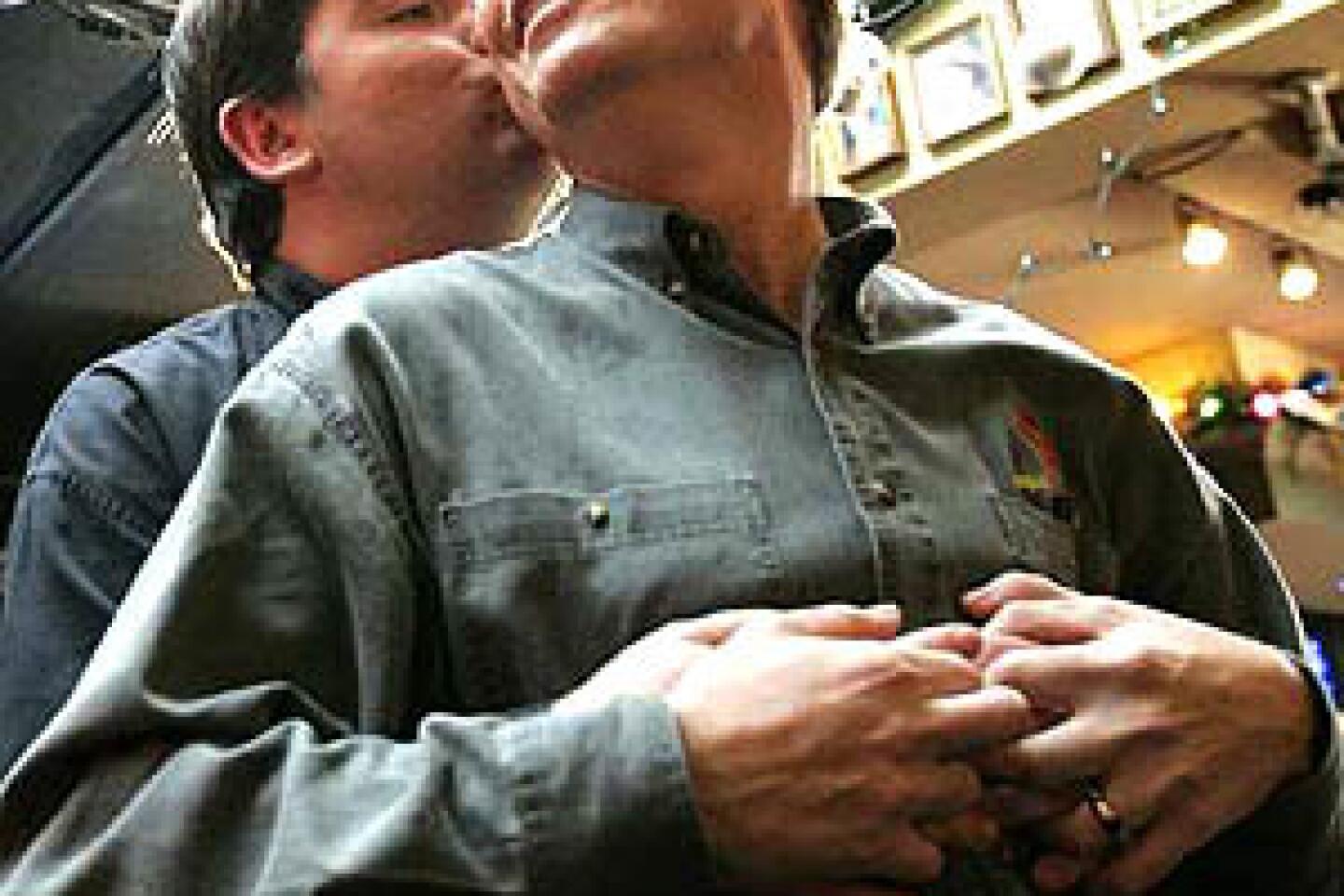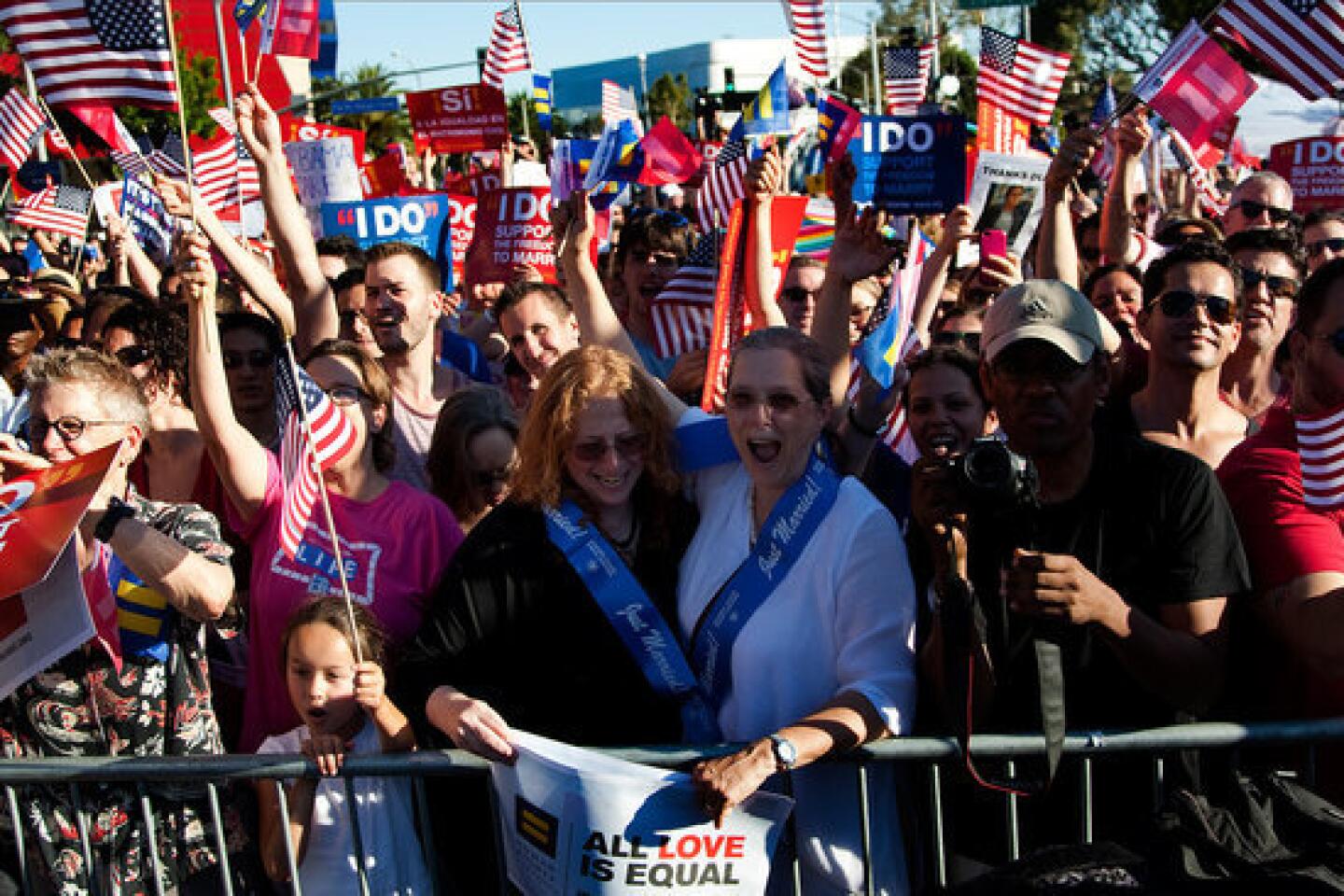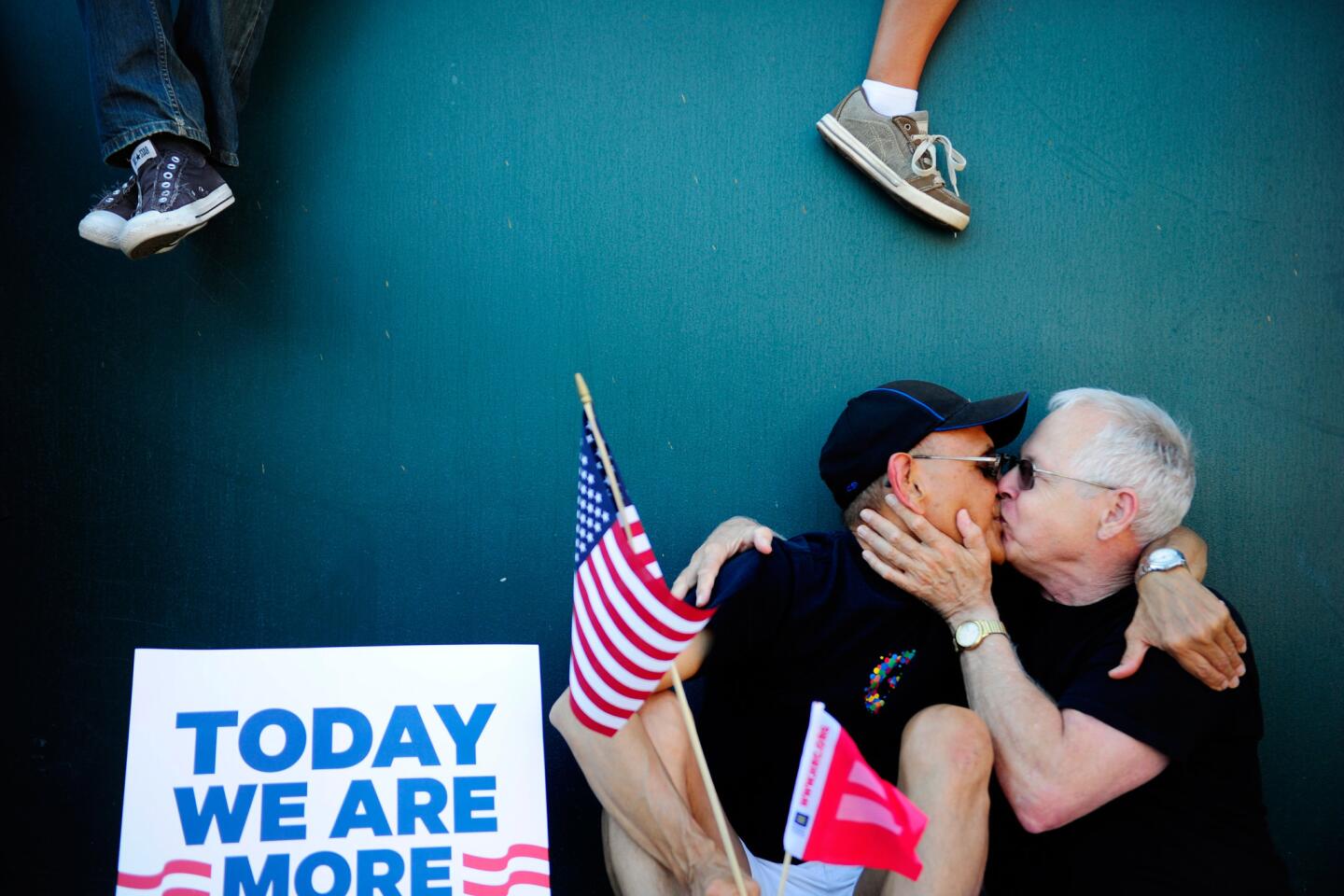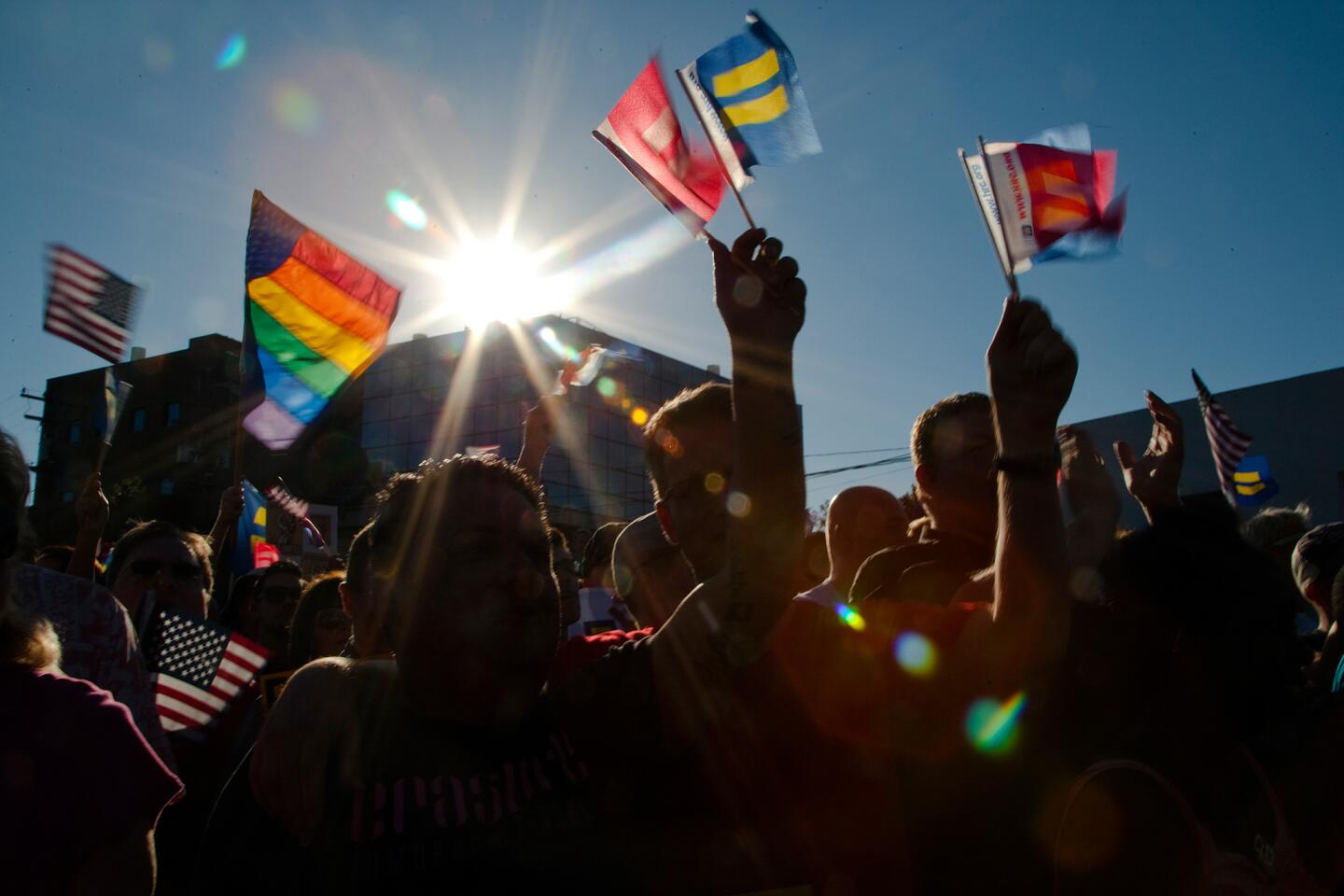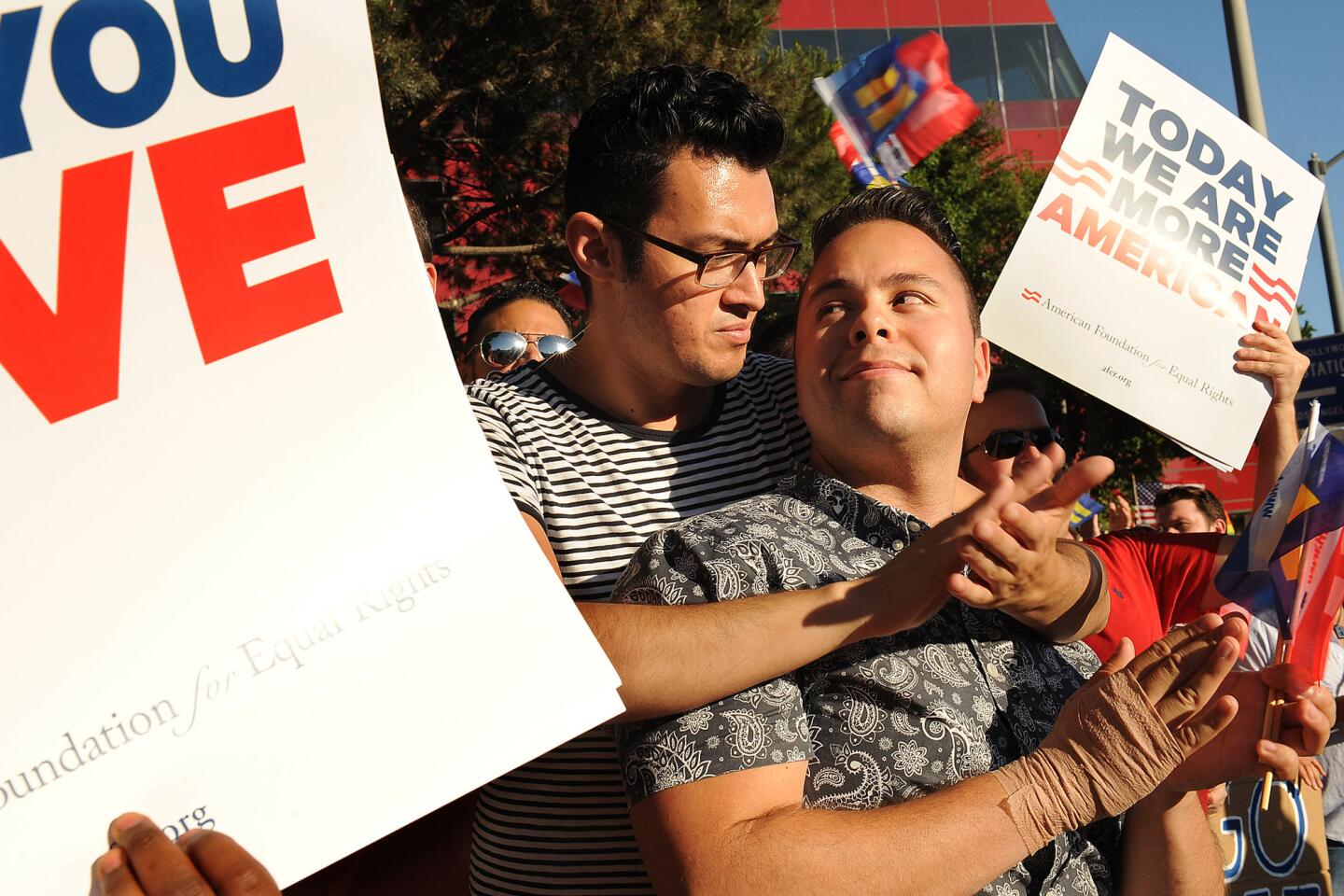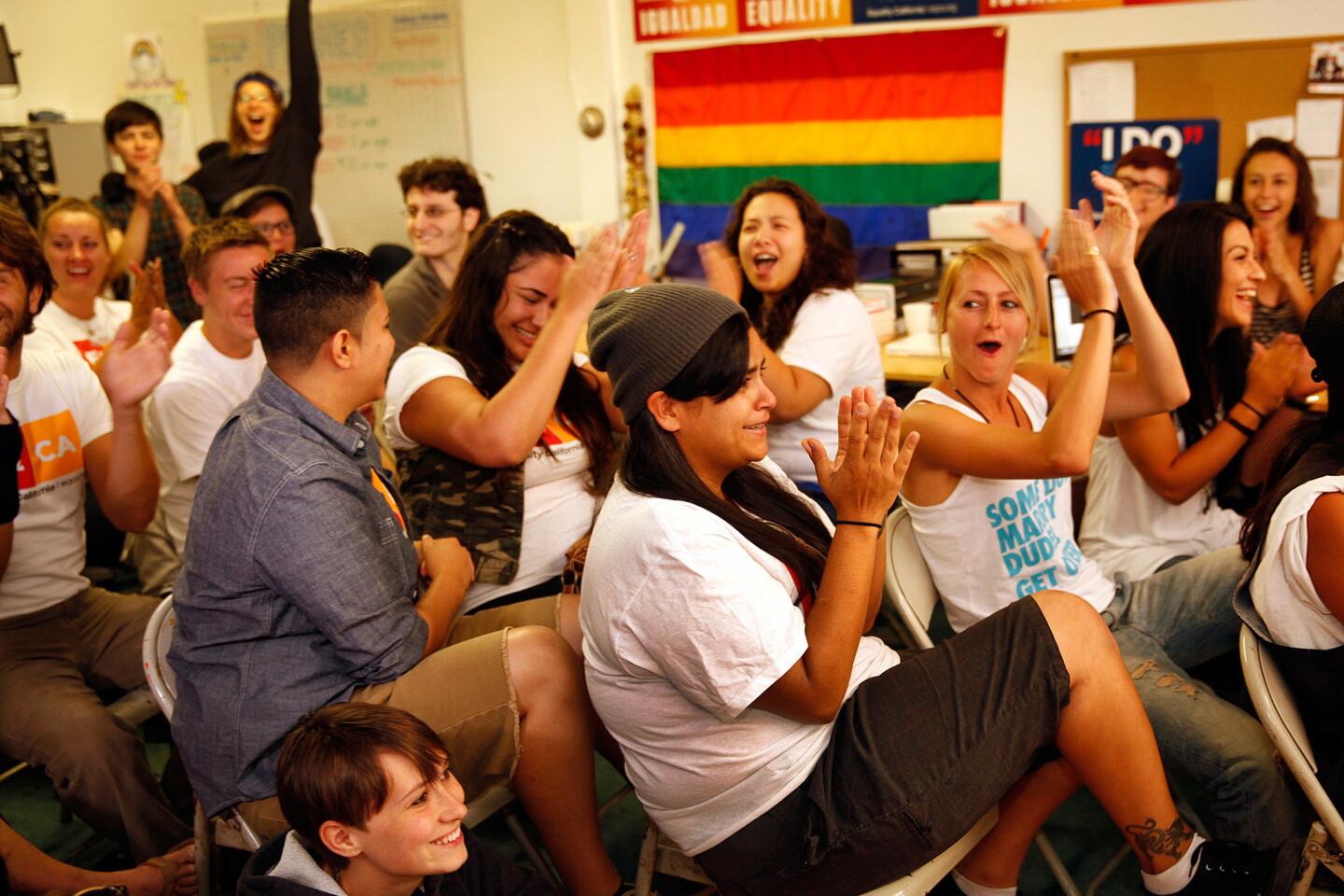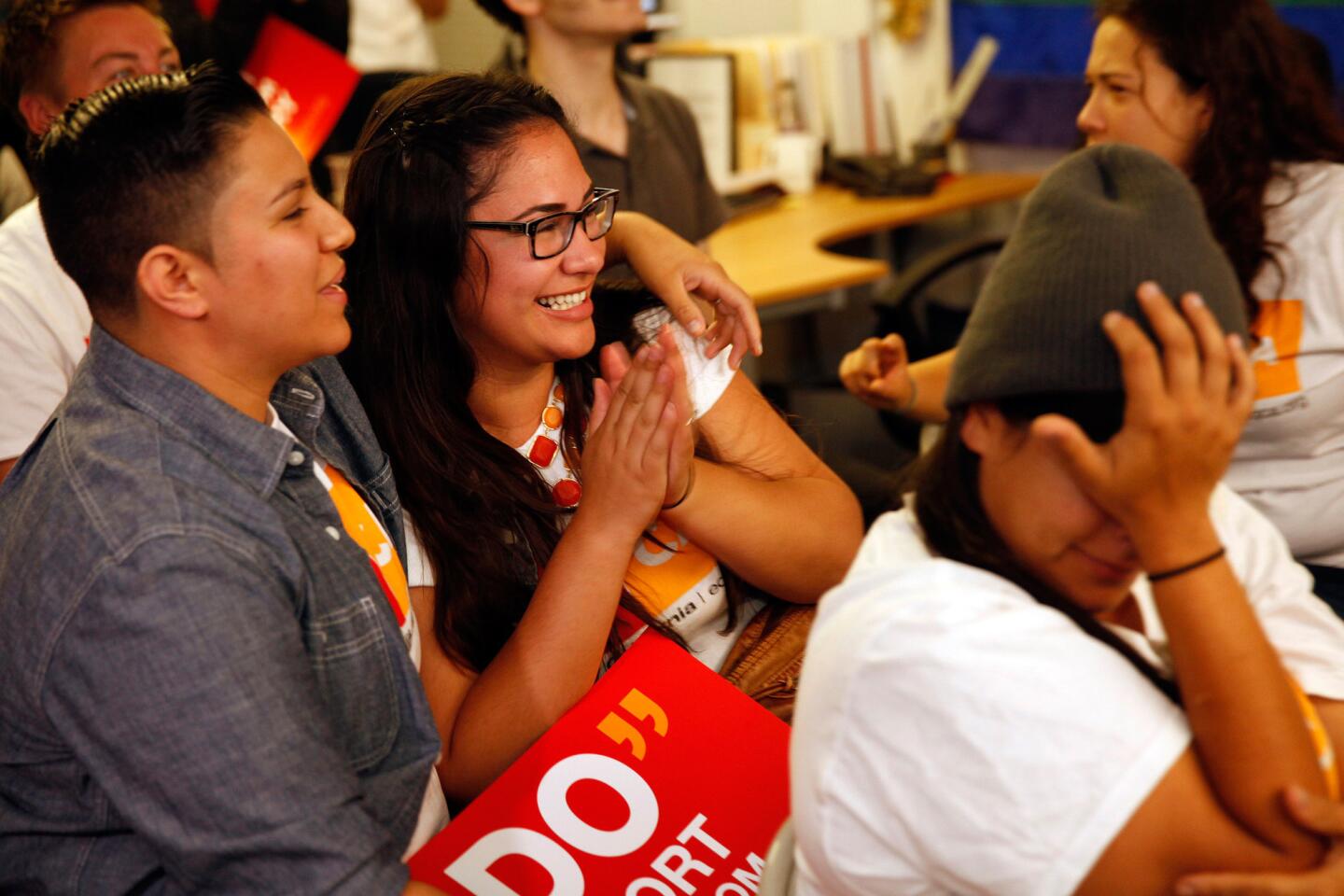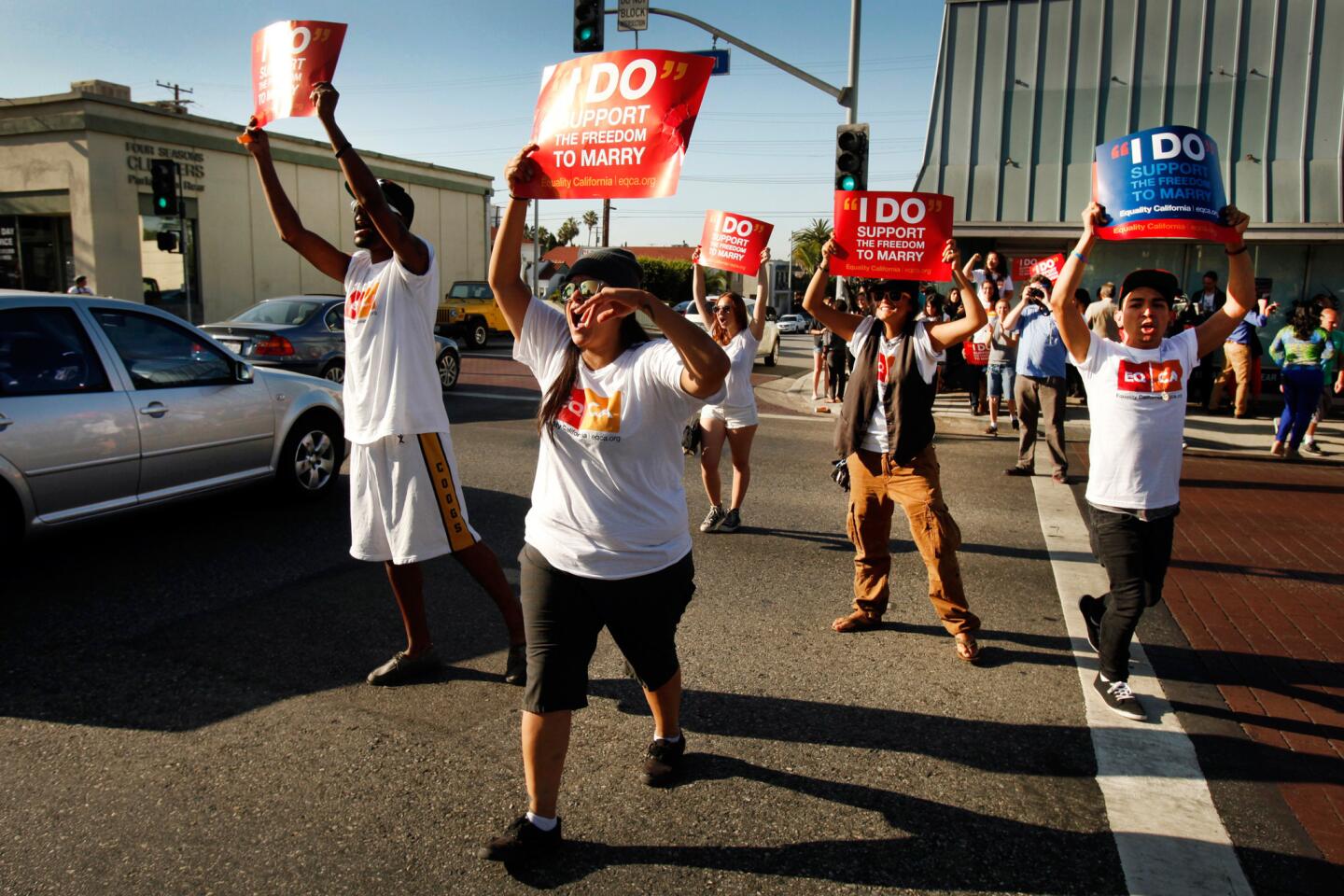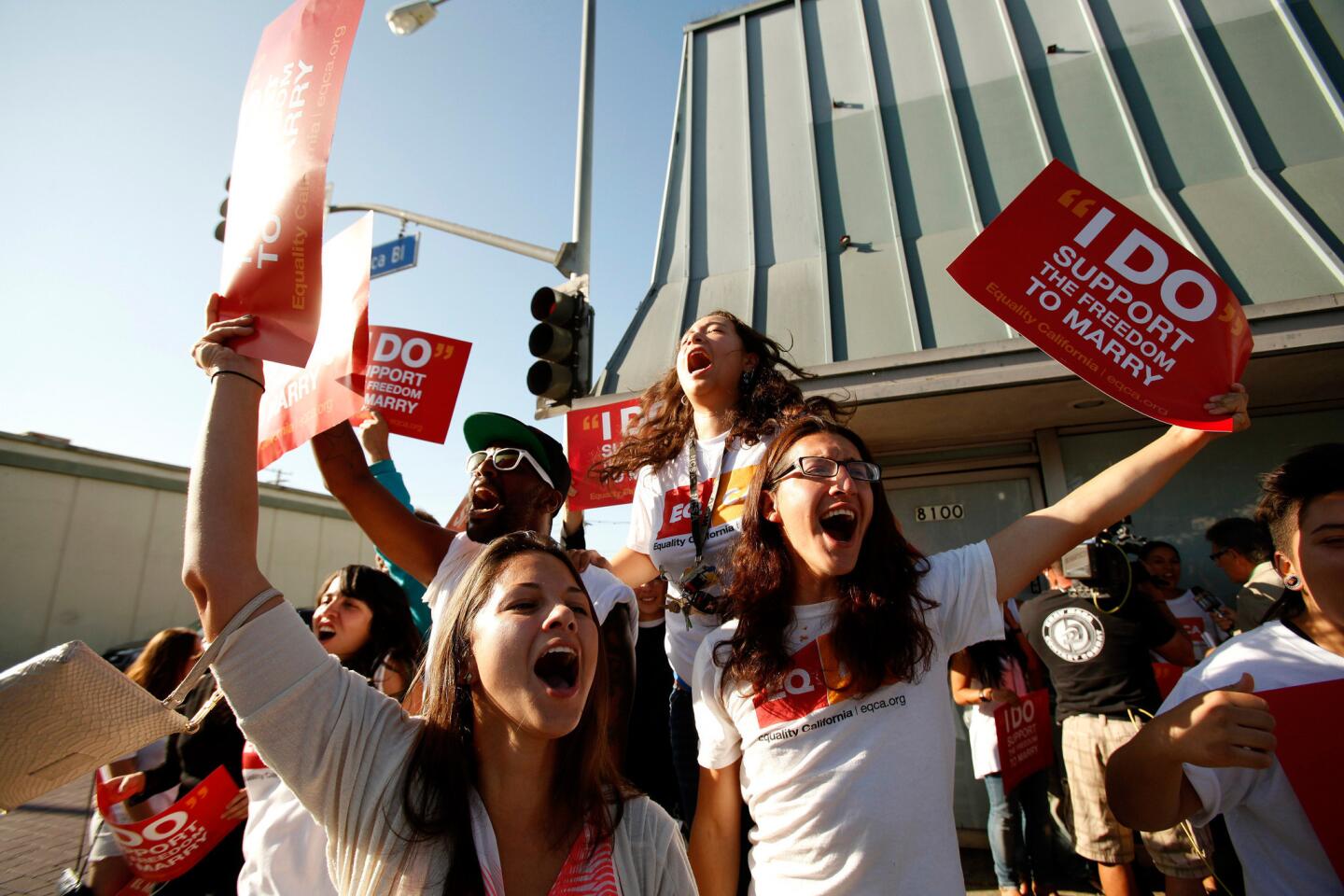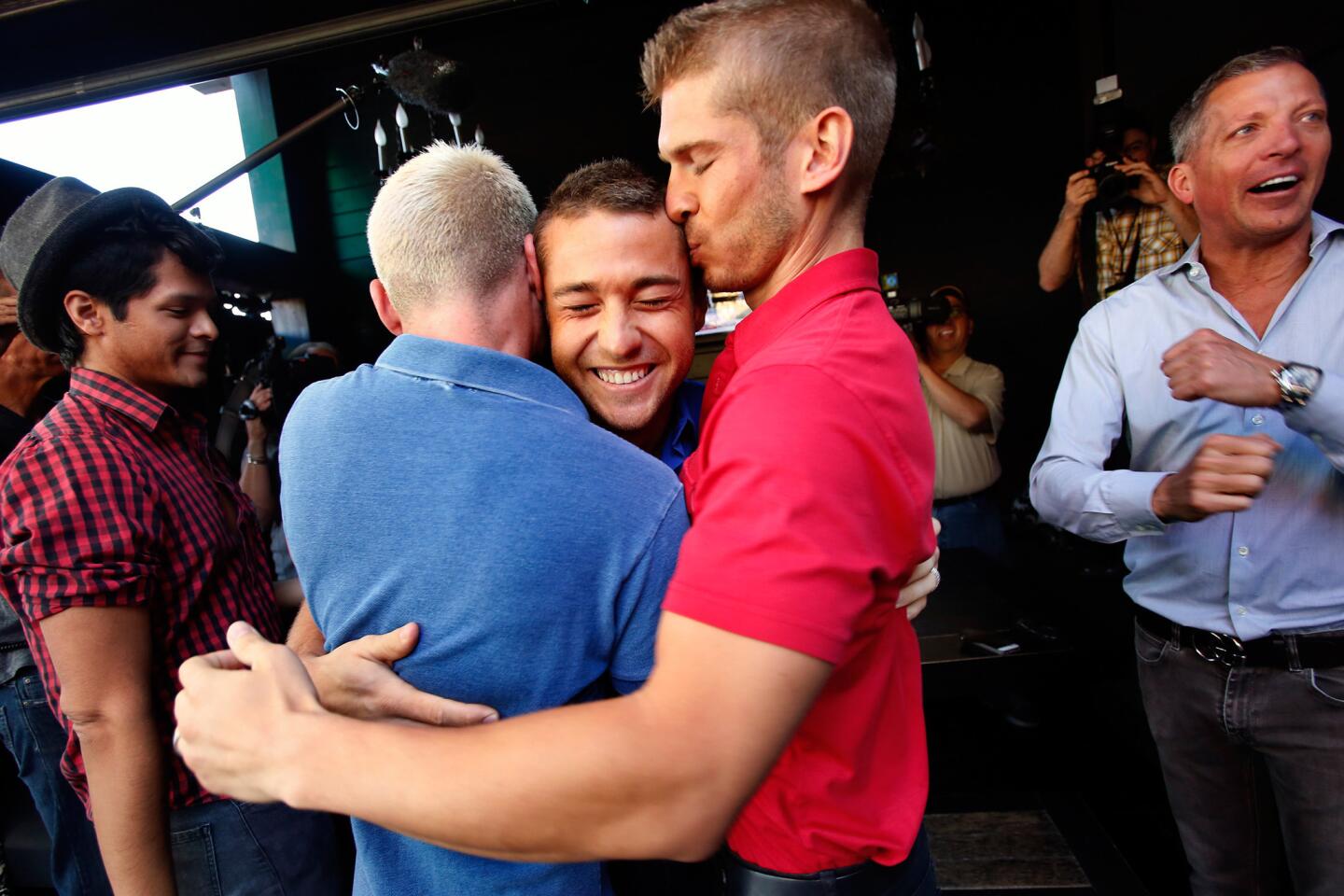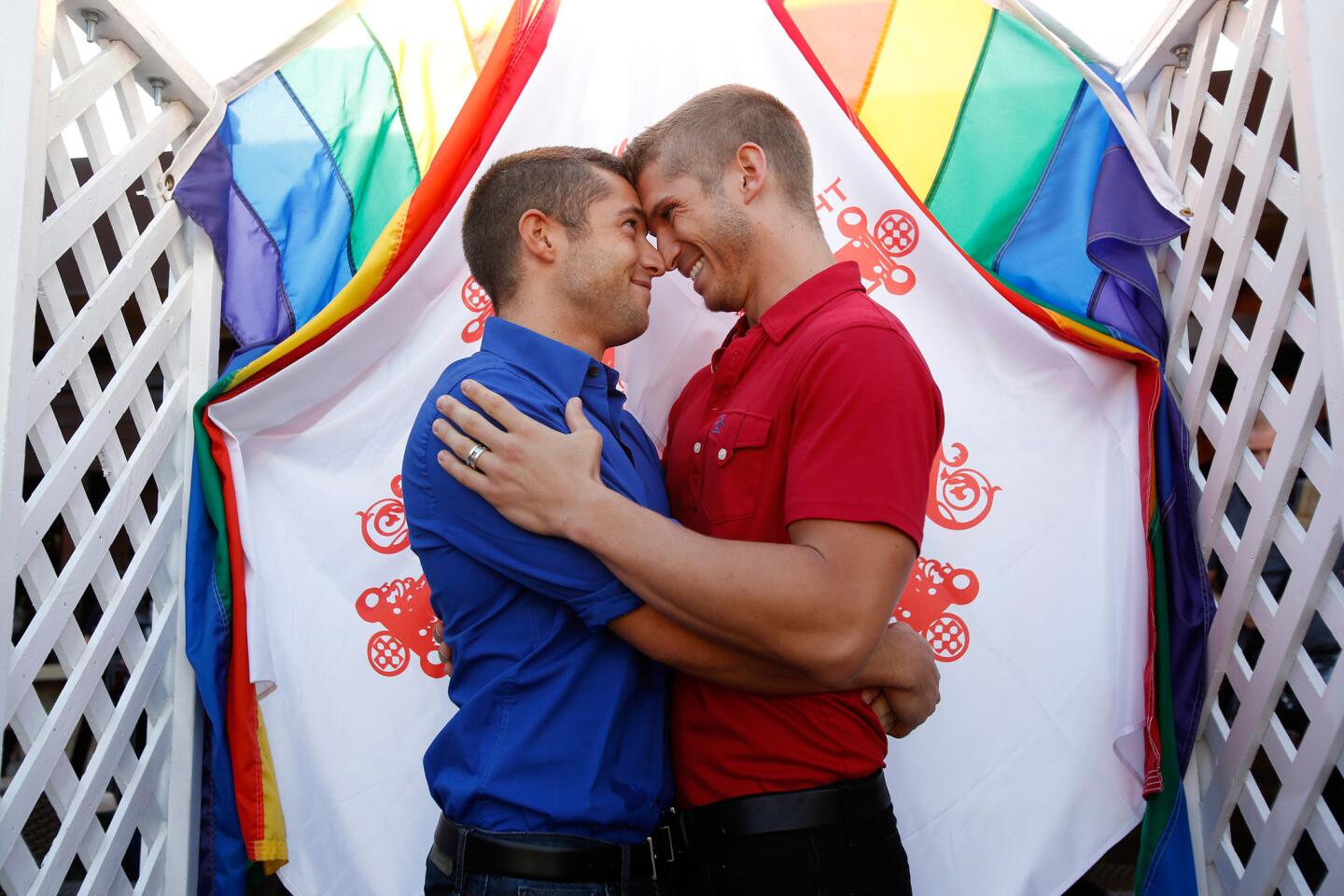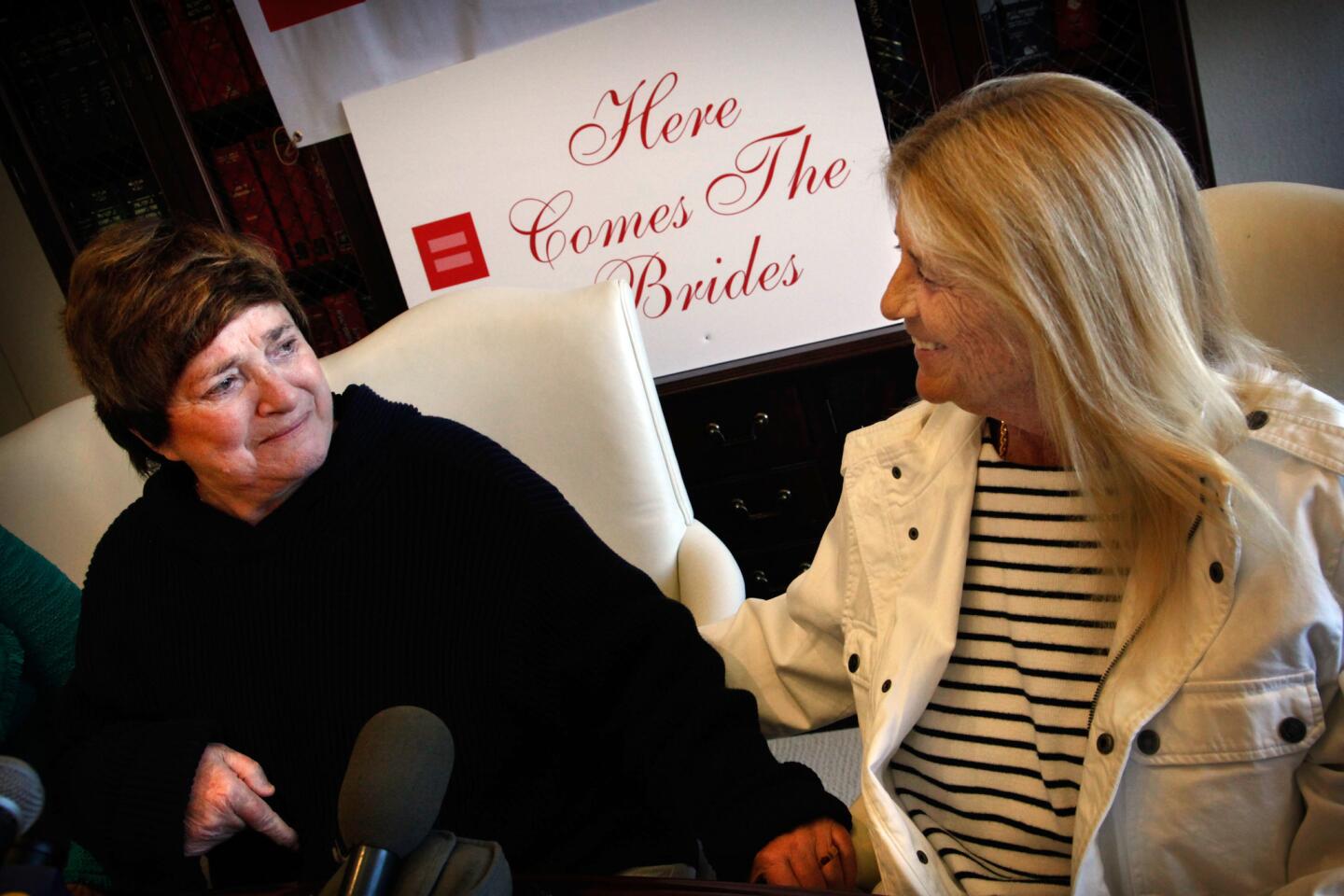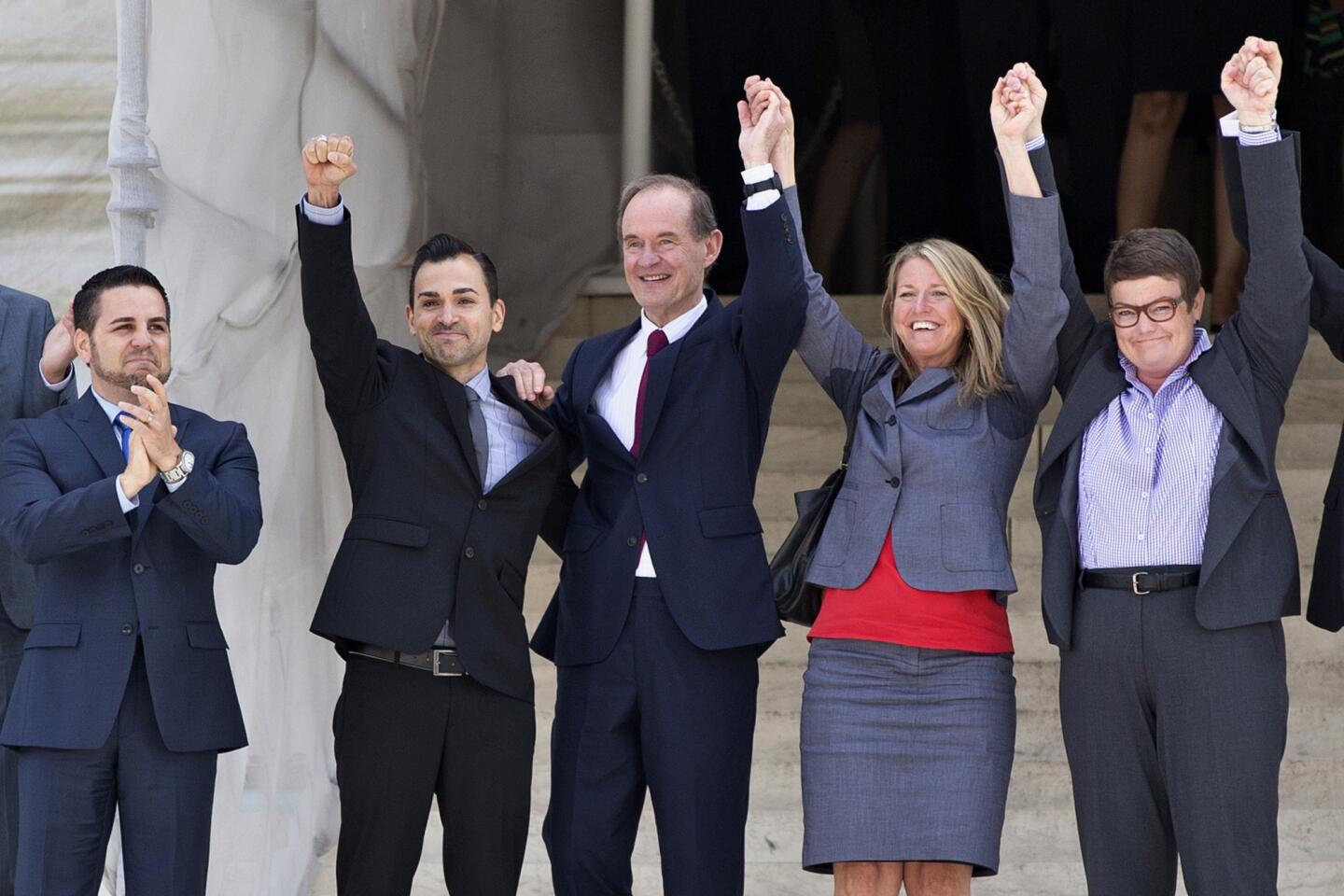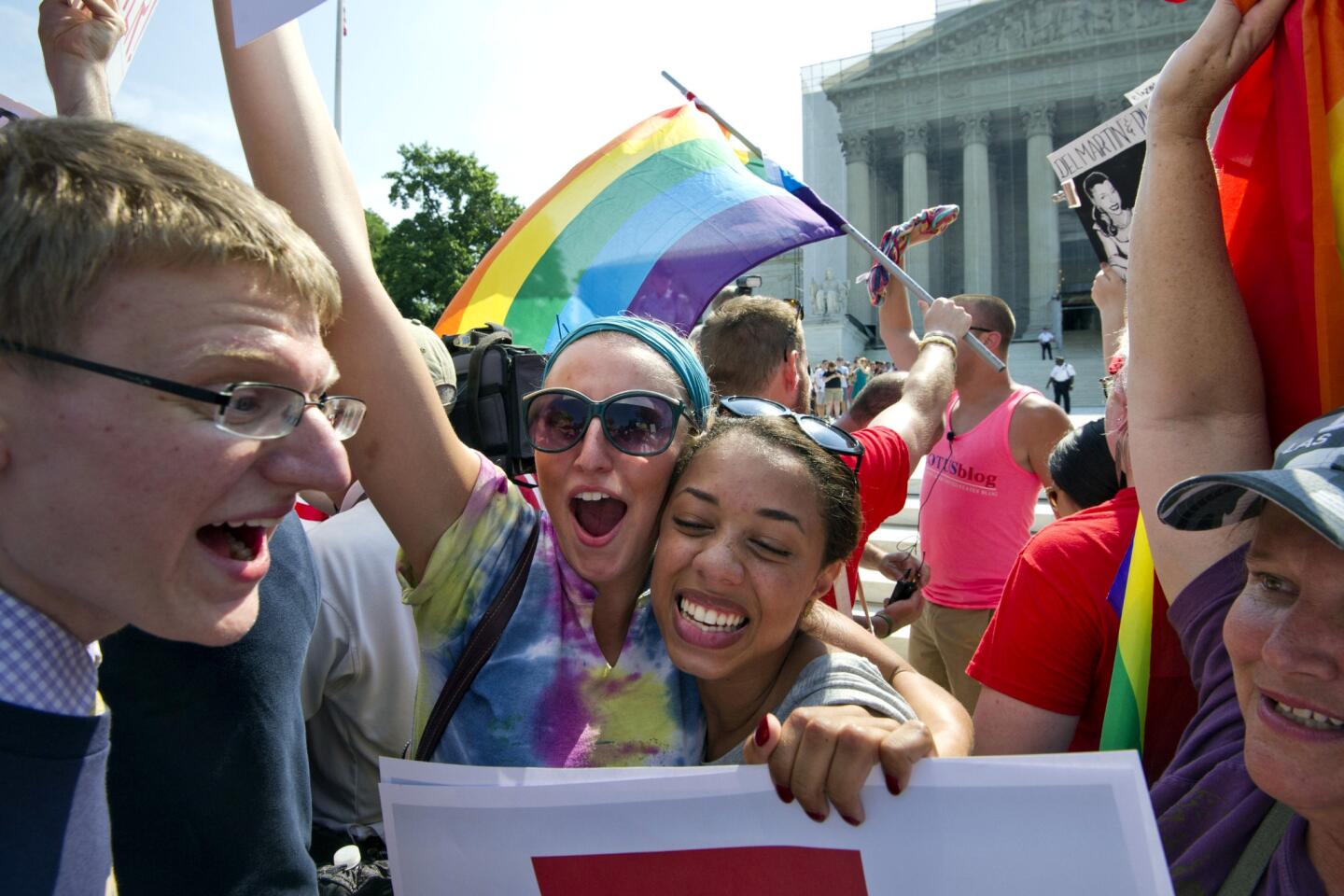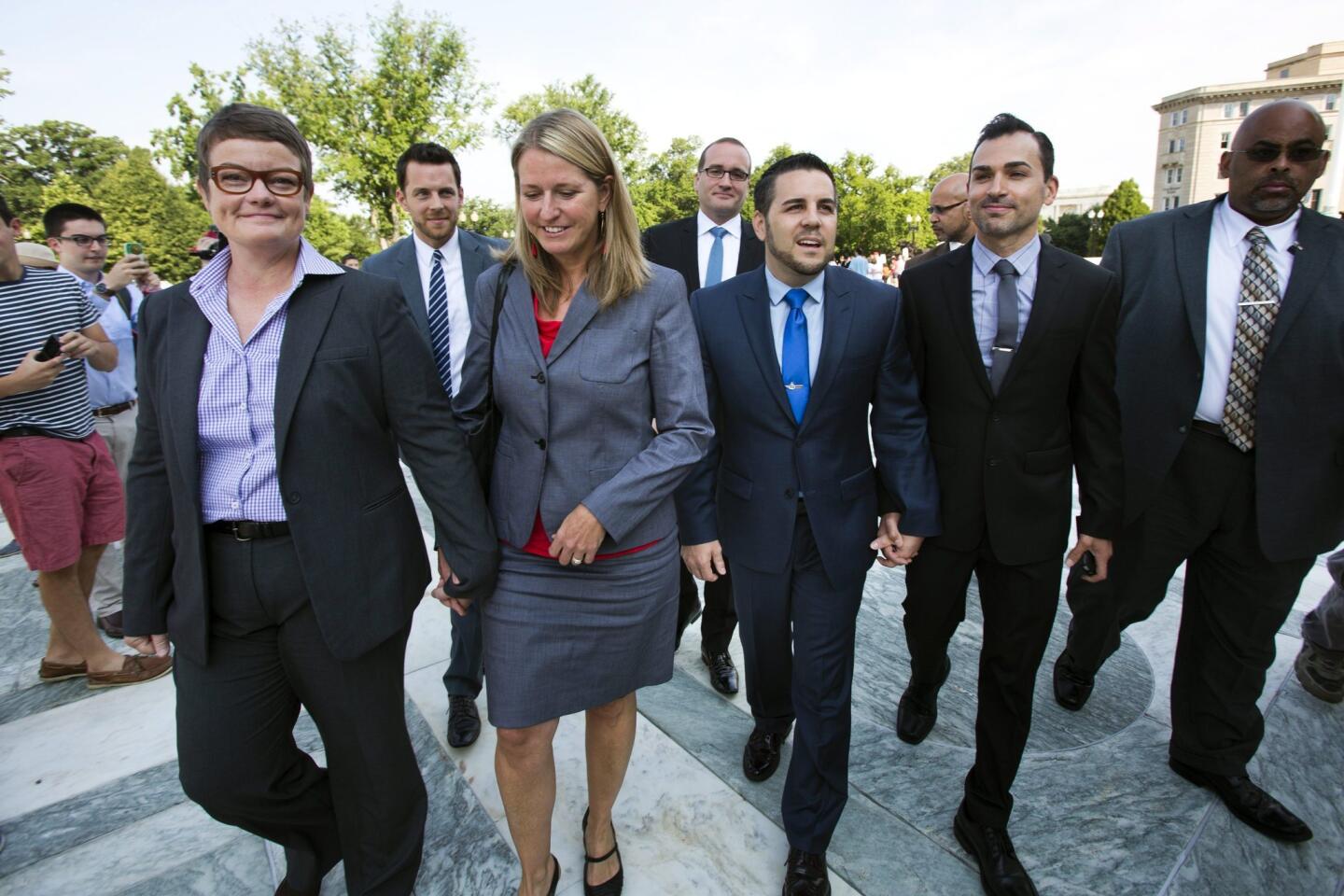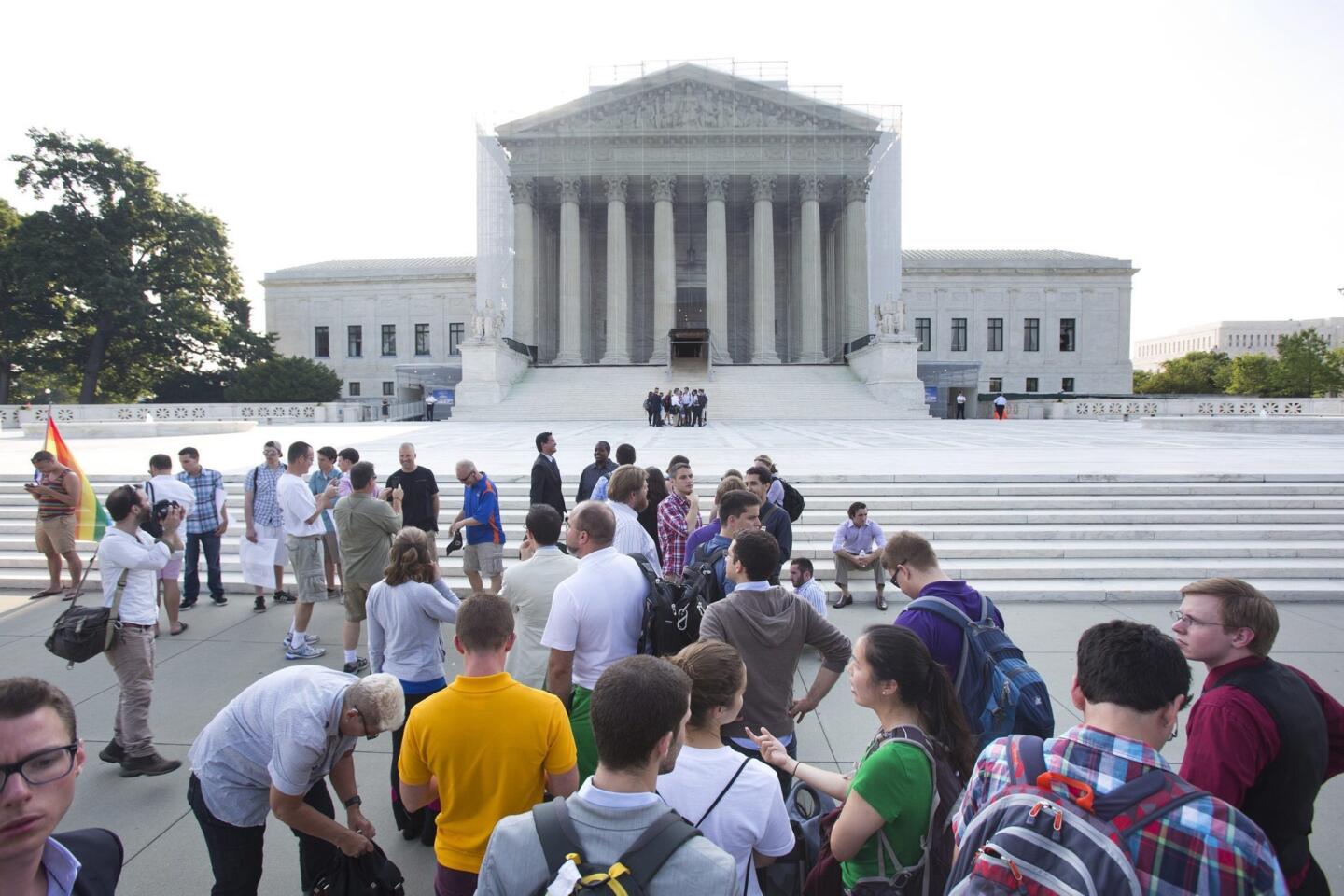Q&A: Does death of DOMA help gay couples outside California?
Following the Supreme Court decisions that handed major victories to the gay marriage movement, we look at how the decisions affect gay couples who live in states that ban same-sex marriage.
Here are answers to some essential questions.
Can same-sex couples from Texas get married in California?
Yes, same-sex couples who live in states that ban gay marriage can marry in California. You don’t have to live in California to get married here.
Does the ruling only benefit same-sex couples living in states that recognize same-sex married couples?
The ruling striking down the federal Defense of Marriage Act entitles married same-sex couples to at least some federal marital protections, no matter where they live in the United States--even those who live in states that don’t recognize gay marriage.
Would a married gay couple living in Texas, which does not recognize gay marriage, receive the same federal benefits and be recognized at the federal level as a legitimate married couple?
It’s complicated. One issue is that there are some federal benefits that are only available to couples who are recognized as married in the state where they live, according to a fact sheet for same-sex couples in California published by the American Civil Liberties Union and gay rights groups.
As the Los Angeles Times’ David Lauter and Kathleen Hennessey report, gay-rights advocates want the Obama administration to declare a uniform standard, so that a gay couple married in California can keep federal benefits even if they move to Tennessee, which does not recognize gay marriage.
My partner and I have been together for almost 11 years; I am a U.S. citizen and he is from China. Does this mean he can apply for a green card once we are officially married?
Yes, that’s the intent of the ruling and applies in most cases. But immigration law is really complicated, so it’s best to talk to a lawyer before making a decision.
According to the fact sheet, some complicating factors include “whether you and your partner are together or apart; whether you are living together in the United States or abroad; whether you and your partner have married; whether your family can marry; and for families together in the United States whether the non-U.S. citizen partner arrived in the United States after having been inspected by an immigration officer or whether they entered without inspection.”
What was the Defense of Marriage Act case all about?
Edith “Edie” Windsor, now 84, sued the federal government four years ago, angered that after her wife, Thea Spyer, died, she was left with an inheritance tax bill of $363,053. Windsor would not have received that bill had the U.S. government recognized her marriage. Windsor, who lives in New York, married her wife in Canada in 2007. Spyer died in 2009.
The Supreme Court on Wednesday found that it was unconstitutional for the federal government to deny recognition of same-sex marriages. The court majority ruled that this section of the 1996 federal law violated the people’s right to equal protection of the laws.
When will gay marriages resume in California?
The U.S. Supreme Court’s ruling on Proposition 8 will go into effect in 25 days -- which is Sunday, July 21.
If normal procedures are followed, at that time the 9th Circuit Court of Appeals in San Francisco will be able to lift its stay on the original 2010 decision by U.S. District Judge Vaughn R. Walker declaring Proposition 8 to be unconstitutional.
“The normal process is for this court to wait to be notified of the judgment by the clerk of the Supreme Court. That won’t happen until the 25-day period expires. Once the judgment is received, the panel that decided the case will take action,” David Madden, a 9th Circuit official, told The Times’ Maura Dolan.
At a news conference, California Atty. Gen. Kamala Harris asked for the 9th Circuit to act immediately, before the 25-day period is over.
Gov. Jerry Brown on Wednesday ordered all 58 California counties to begin issuing marriage licenses “as soon as the 9th Circuit confirms the stay is lifted.”
How does the court’s ruling apply to the 37 states that ban gay marriage?
Wednesday’s ruling does not affect the 37 states that ban gay marriage.
It avoided giving a ruling on nationwide grounds because, the court majority argued, the supporters of Proposition 8 did not have the legal standing to appeal the case to the 9th Circuit Court of Appeals or the Supreme Court. The court majority said the Proposition 8 sponsors did not suffer injury as a result of the original 2010 ruling striking down the ballot measure.
But the court’s ruling will not end the debate in those states.
Backers of same-sex marriage declared a new goal: a five-year campaign to strike down the laws in the remaining states that prohibit such unions.
As The Times’ David G. Savage writes, although there was no nationwide ruling, even Justice Antonin Scalia, in dissent, said the court’s opinions will be read by judges across the nation as suggesting that bans on gay marriage are unconstitutional.
What does the Supreme Court’s ruling on the Defense of Marriage Act mean?
The ruling will bring federal recognition to more than 100,000 gays and lesbians who were legally married. The justices by a 5-4 vote said the federal law denying benefits to gay married couples was unconstitutional because it denied them equal protection of the laws.
Could the Supreme Court, in the future, rule on whether there is a federal constitutional right for same-sex marriage?
Yes, the Supreme Court could rule in the future if there’s a federal constitutional right to same-sex marriage. Unlike California, where Brown and Harris refused to defend Proposition 8 in federal court, there are other states whose elected officials will defend bans on gay marriage. That could set up a showdown at the Supreme Court once again.
What are backers of same-sex marriage saying after the court decision?
Backers of same-sex marriage declared a new goal Wednesday -- a five-year campaign to strike down the laws in the remaining states that prohibit such unions.
As The Times’ David Lauter writes, first, the campaign will unfold in legislatures and ballot initiatives. Gay-rights groups hope that if enough states adopt laws allowing same-sex marriages, the Supreme Court will be willing to overturn the remaining statutes, much as it did in 1967 when it struck down laws that banned interracial marriages.
What do opponents of gay marriage say is their next step?
Some gay marriage foes said they will fight on.
“This is far from over, I can tell you,” said Chapman University law professor John Eastman, who supports the same-sex marriage ban.
Nationally, opponents of same-sex marriage will try to fight state by state and argue that the issue should be settled locally.
In California, Eastman said the supporters of Proposition 8 could challenge the scope of Walker’s order in federal district court or in state court under a provision of the California Constitution that prevents state officers from refusing to follow laws without an order from an appeals court.
But Santa Clara University law professor Gerald Uelmen, an expert on the state constitution, said the provision cited by Eastman does not apply to constitutional amendments such as Proposition 8. “I think they would be laughed out of state court,” Uelmen said.
More questions on gay marriage? Tweet @ronlin, leave a comment, or email us at ron.lin@latimes.com and we’ll try to answer.
ALSO:
Prop. 8: Court officials await green light for gay marriages
Suspect in ambush of two LAPD detectives seen on security cameras
L.A. Now Live: What does the Supreme Court’s Prop. 8 ruling mean?
More to Read
Sign up for Essential California
The most important California stories and recommendations in your inbox every morning.
You may occasionally receive promotional content from the Los Angeles Times.
